#its time for a loving science fiction about humans being the first intelligent life in the universe and leaving messages behind
Explore tagged Tumblr posts
Text
guy who constantly starts stories and never finishes them..
#sorry horror short story no. 1 rorschach edition#sorry horror story no. 2 mars edition#sorry horror short story no. 3 AI edition#sorry the 838928 character study fics in my brain#its time for a loving science fiction about humans being the first intelligent life in the universe and leaving messages behind#if i could battle the executive dysfunction and shit id be the most prolific artist in the world#as it is i looked through like 1000 knitting patterns a few days ago GNSDLSH#personal /
1 note
·
View note
Text
Friend Like Me: Murderbot's Relationships With Other AIs throughout The Murderbot Diaries
It’s important to me that the thematic core of The Murderbot Diaries is not only about determining what it means to be a robot person in a human world, but about showcasing so many ways to be a robot person in a human world. And about building relationships with other robot persons to support that self-actualization as both a robot and a person.
So often, in science fiction about robot personhood, the robot character is the only robot in the cast. Not only that, so often the robot character is the only robot they know.*
When media thinks about AI personhood, or Ais as characters in society, the AI character is often alone. Alone, and different. It’s a potent allegory for what it feels like to be an outsider, to be “other,” to feel “off” from the people around you. Whether a sympathetic friend or a scary unknowable villain, a lot of people can relate to feeling like that.
The Murderbot Diaries is doing something interesting, then, by showing us our protagonist Murderbot, the prototypical robot-among-humans, the robot as a parallel for queer and neurodivergent and outsider-cultural experiences in a world of expected norms, the robot with human friends, the one robot member of an otherwise all-human team… and it can’t live like that. So it leaves.
So far, the series feels split into two halves: the first four books, about Murderbot learning different ways to be a robot in relationships with humans, and the next three** about Murderbot learning different ways to be a robot in relationships with other robots, and a robot in a mixed society.
In All Systems Red, Murderbot starts off painfully alone. It repeatedly sees other SecUnits as enemies, and believes that SecUnits can't trust each other because they're all under control of humans. It has a very low opinion of SecUnits, including itself. Murderbot hates being used by humans for violence or for petty reasons, and admits that it wants to half-ass its job.
In Artificial Condition, Murderbot meets ART, a university research ship who loves its crew and loves its function. It is also free to be a snarky asshole, as Murderbot repeatedly notes (and assigns in its very name). This relationship to humans—genuinely caring for its crew, genuinely wanting to participate in its research and teaching function—is a very different relationship than Murderbot has had, though ART still needs to keep its intelligence and personality hidden from most humans for its own safety. Conversely, this is the book where Murderbot meets a ComfortUnit that is blatantly being abused and misused by its human owner, and it hates her. The contrast between ART and the ComfortUnit displays very different ways of Ais relating to their human “owners”—and what it means for them to get what they want out of life.
In Rogue Protocol, Murderbot confronts this theme most directly, with the bot Miki. Unlike the implications of secrecy we get from ART, Miki is not hidden from anybody; unlike with the ComfortUnit, Miki is a respected and equal member of its team. Murderbot has a very hard time believing that Miki is anything but a patronized “pet bot” to these humans, despite the evidence that the humans genuinely consider it a friend and teammate. Miki has never been abused, and never had to hide. Murderbot has a hard time accepting that this is a way bots and humans can relate to each other.
But Miki is still, in the classical sci-fi robot-on-a-human-team way, unique; it expresses to Murderbot, “I have human friends, but I never had a friend like me.”
This is a much better way of being a robot among humans than Murderbot has seen before, but it’s still not the ideal Murderbot wants, either.
Exit Strategy brings the theme full-circle and the quartet to a close. Murderbot faces off against a Combat SecUnit (or CombatUnit; Wells seems to change her mind about this). The Combat SecUnit represents everything Murderbot has rejected being, everything it has overcome on its journey of self-actualization. During their fight, the CSU rejects Murderbot’s offers of freedom, money, a fake ID, the opportunity to get out of its situation the way Murderbot has; it ignores the offer. Murderbot asks the CSU what it wants. The CSU replies, “I want to kill you.” The CSU represents the kind of SecUnit Murderbot does not want to be, the kind of robot it used to think it would inevitably be but has now seen so many other ways it can be. Murderbot says in the same scene, “I’m not sure it [the offer of freedom] would have worked on me, before my mass murder incident. I didn’t know what I wanted (I still didn’t know what I wanted)…” But at the same time, the confrontation makes it clear: Murderbot knows some things it doesn’t want, and the CSU is embracing everything Murderbot doesn’t want about being a SecUnit.
If this quartet is about what it means to be a robot, and to be a robot among humans, then the next set of books (Network Effect, Fugitive Telemetry, and System Collapse) is about being a robot among other robots, and a robot in a society that supports both humans and robots.
Fugitive Telemetry makes this most obvious, with its plotline about the free bot community on Preservation. Murderbot is uncomfortable around them in a similar way that it was uncomfortable around Miki. The Preservation bots are happy, fulfilled, responsible, mutually supportive, and have a meaningful community with both humans and each other that does not match Murderbot’s experiences of what being a bot, or being a bot among humans, means.
Network Effect brings Murderbot back into contact with ART, and introduces a new SecUnit, Three. Murderbot navigating its relationship with ART as a free agent and after a perceived betrayal is a huge part of the book. Murderbot’s disembodied-software-fork Murderbot 2.0, freed from much of Murderbot’s organic anxiety, shows itself much more willing to be social with other bots and constructs. System Collapse follows, bringing further depth and complexity to Murderbot’s relationship with ART and expanding its interactions with Three, and furthers Murderbot’s integration into the casual bot-human community that is ART’s crew. It also shows that Murderbot’s willingness to trust and even form tentative friendships with other AIs and systems, like AdaCol2, has expanded. The way it extends the governor module hack to the opposing SecUnits is informed a lot more strongly by Murderbot 2.0’s interactions with Three than its own previous clumsy attempts to reach out to the CSU in Exit Strategy, or abrupt dumping of the hack on the ComfortUnit in Artificial Condition. All of these plotlines emphasize Murderbot maturing into not just being a person among humans, but a person recognizing its place and obligations within society that includes both people like and unlike it.
The models of the many ways to be a robot person, and significant relationships and interactions with other robot persons, were and are crucial to Murderbot’s development, sense of self, articulation of its desires, and sense of belonging in the world. Murderbot isn’t alone, and it’s not the only person like itself that it knows. When offered a place in society, it is not the only person like itself in that society. Meeting other AIs, forming relationships with them, was crucial in helping it articulate what it wants in its life. Its human friends are incredibly important to it! That doesn’t stop being true. But so are its AI friends, and the other AIs it passed through the lives of.
This feels like one of the most honest and affirming depictions of what it’s like to feel “other”—that being around only majority people unlike-you, even the ones you like, even your friends, even the ones who mean the best for you and ask you what you need and do everything they can to provide it, can still be exhausting and alienating. Meeting other people like you—even if they’re like you in unlike ways, and have different ways of moving through the world—shows you the many ways to relate to the rest of the world, to be in the world. The many ways to relate to other people and to yourself. The Murderbot Diaries opens up a world where that can be true of bot/construct/AI characters, when so often in sci-fi, their loneliness and alienation is where the metaphor stops.
- - -
*Lt. Data from Star Trek: The Next Generation is probably the most famous example; the only positronic android like himself in existence, barring his evil twin who mostly just needs to be stopped. Others coming to mind include Becky Chambers's A Closed and Common Orbit, in which the AI character is trying to understand who she is in the context of being surrounded by humans; Alien, the secret android crewmate among humans is a threat, and in the sequel Aliens, the android crewmate is earnestly trying to prove he's not; Space Sweepers has a ragtag crew of several humans and a robot; most of the stories in Isaac Asimov's I, Robot are about a singular robot in a human facility. The setup "Human crew with their ship AI" is fairly common in sci-fi, from 2001: A Space Odyssey with its tragically antagonistic HAL9000 operating on a logic that would never occur to humans, to Wolf 359 and The Long Way to a Small Angry Planet where the ship AIs are struggling to determine and articulate how they want to relate to their human friends. Even in Ancillary Justice, Breq is alone and having to pass undercover as human cut adrift from her previous life as a ship's AI. (I know this changes later but I have not actually read the rest of the trilogy)
**as of System Collapse
209 notes
·
View notes
Note
For the Reverse Unpopular Opinion meme: would love to give you the excuse to talk about voyager. (or if that's too easy, something you like about your least favorite star trek series??)
i love voyager. so so much. i tried to think if i love another star trek series i've seen any less than voyager, but i can't honestly say that i do? i love ds9, tos, discovery, and, yes, even snw. i am in the embarrassing position of admitting that i really just love star trek, in a mostly uncomplicated way.
of the things i love about voyager, the premise is probably the biggest one. i have rambled about this a lot already but: i think it confronts for the first time in star trek the inherent sadness associated with us studying the stars--and therefore the sadness that science-fiction writers mostly imagine their way out of, often as a way to speculate a time when this reality may be less real: the fact that space is big. it is too big. the fastest human beings have ever traveled, with their own bodies along for the ride, still isn't fast enough to get us to the moon in less than three days. light--the speed limit of the universe--needs a full eight minutes to get from the sun to us--a relatively close planet. space is enormous. we measure things that are "close" in light-years. everything is so spread out and that's just from the perspective of being inside a galaxy, which is actually crowded when compared to intergalactic space. everything is so far away and so long away and it feels impossible to think of getting anywhere in a time meaningful to us and our lifespans. which is in its own way heartbreaking.
and while in voyager they are clearly not alone in the way we feel we could be (and in practice are until we get the smallest sign that even non-intelligent life exists off our very own special rock) with all the aliens they meet and the fact that they are on a ship that can go faster than light, they are stranded and they are on their way back home and it will still take them a life-time. that's the reality of the story: that they will spend the rest of their lives trying to get back. and though i know they do get back much quicker than that, where i'm at in the beginning of season 3 that is still the reality of it. and this makes literally everything that happens in the show so fascinating--even if it's a plot or an idea that not only happened in another series but was done technically better in that series. every plot in voyager is colored by the tension between what the star trek ethos is as a whole--exploration and diversity and learning and humanity--all in an optimistic light--and what voyager is about--getting back home. it makes me think of the tension in the actual "voyagers," somewhere now in interstellar space, and the golden record with a map of earth's position etched onto it: spacecraft meant to never be returned but contained on them is a deep, deep hope that in some way they will be. this tension, to me, affects everything on the show.
but that's maybe too big an idea without specific examples from the series--i might ramble about that at another point lol
in the spirit of your question, i will say there is one star trek property that i don't particularly care for on the whole and that's the 2009 movie (and sequels). but i will also say what that movie did right and what i do love about it even if i don't love the movie as a whole is how it portrayed the high-tech poetics of star trek in a much more immediately understandable way than even the 90s shows could for a 21st century audience. the "apple-store" aesthetic is really an argument about how this is the future and it's sleek and stylish and humans have advanced in their engineering and scientific abilities. and among this high-tech argument is uhura front and center: she's very loudly and explicitly a linguist and she fits in this silicon-valley look despite the fact that nowadays things like linguistics are considered "soft sciences" in a general way and treated like that very specifically by the tech-industry now (the attitude being "there's an app for that"). but uhura makes a central discovery in one of her labs at the beginning of the movie which gives her and kirk a leg up on understanding the Movie Threat. the 2009 movie significantly raised her importance as a character, to the point that the "main trio" in those movies is, arguably, more kirk/spock/uhura than it is kirk/spock/mccoy---especially if you're going by the movie posters.
also they gave her this line:
UHURA: And did I not, on multiple occasions, demonstrate an exceptional aural sensitivity, and I quote, "an unparalleled ability to identify sonic anomalies in subspace transmissions tests?"
which is excellent world-building about communications-officers, if you care for that sort of thing. and it provides a starting point for an argument about how listening to a universe (famed quiet due to the lack of material through which sound can travel) is essential to understanding it---an idea that can be further extrapolated via sci-fi regarding things like: listening to gravitational waves if we record them right; or working on the idea that all matter is but a vibration in a quantum field; or, from a more cultural concern, the implication that it is absurd to think you can travel to an alien world and not bring someone with an "exceptional aural sensitivity" who can facilitate an exchange of language and, thereby, meaning.
#star trek#thanks so much for asking!!!#i love rambling on and on about star trek apparently. really enjoyed this exercise y'all#voyager#star trek: aos#uhura
39 notes
·
View notes
Text
The Mosley Review: Alien: Romulus

Since the dawn of time and creation of the science fiction genre, there have been 3 pillars that have stood the tallest: the parasite, the hunter and artificial intelligence. Each pillar has been represented by 3 of the greatest icons known as the Alien, the Predator and Terminator. All 3 have crossed each other in comics, 2 of them fought in film and only 1 has truly returned to it’s former glory. Terminator needs more time in the factory while the film Prey has taken the Predator franchise back into the right direction. Less is more and that lesson was on full display here in this new entry into the Alien franchise. Like most of you, I was disappointed by the events of Alien: Covenant and I have been begging for the franchise to return to its horror / claustrophobic roots and it finally happened. What I truly loved about this film was not only its directly connection to the 1979 classic, but how it puts us right back into the familiar, harsh and unnerving atmosphere. The consistent tone of dread was welcomed as the story unravels from its heartfelt beginnings and quickly descends into the harsh and brutal nightmare. The many Easter eggs were fun to catch in the corners of the frames and there is a reveal that worked for the lore, but was still a funky in execution. Either way, this was everything I wanted this film to be and the wonderful cast led us through it brilliantly.

The amount of immersion the cast brought was fantastic as they weren't science officers or soldiers, but just normal people trying to make it out of a tough life. Cailee Spaeny is quickly becoming a talent to keep an eye out for. As Rain, she brings that innocence and hope to the film as she strives to make a new life for herself and her surrogate brother. I loved how she balanced the amount of terror and strength she felt in the most harrowing moments of the film. She truly studied what made Ellen Ripley so great from the first film. David Jonsson was outstanding as her surrogate brother Andy. I was completely taken off guard by his reveal early in the film and I kinda want to keep it that way for you. I'll say that throughout the film, he delivers a challenging performance that has so many elements of human expression while keeping the same look on his face throughout. Even with his sometimes cold and analytical way, he still had a charm to him that wasn't as cold as perceived at first. Archie Renaux was great as the leader of the crew, Tyler and the emotional journey he goes through in one scene was painful and well acted. Isabela Merced was great as Tyler's sister, Kay and I enjoyed the chemistry between her and Rain the most. Key gets to witness some of the most terrifying and grotesque moments of the film and I loved every second of remarkable performance. Spike Fearn was a proper jerk as Bjorn and he keeps the tension high with his attitude towards Andy. He was a great antagonistic protagonist that you wouldn't mind seeing get hurt. Aileen Wu was fun as Navarro and I liked her connection with the crew overall. As you've seen from the teaser and poster, she becomes the star of the show and gets become another participant of an iconic moment in all Alien films.

The score by Benjamin Wallfisch was wonderfully unnerving and delivers on some of the jump scares and thrills. I loved the uses of almost all the themes from the past Alien films being used in select moments as they play right on cue with the visual references. What has been the staple of the Alien franchise is the amount of practical effects and use of CGI when absolutely necessary. This film sticks to that rule and I loved every second we spent on the sets and with the actual Xenopmorph. The film answers the many questions of the creature and adds new lore by showing you more about the Xenomorph and I felt like a student in the best way. Like I said before, the practical effects are on point, but the use of CGI for a certain character in the film was great for the lore, but sticks out like a sore thumb. It works visually, but it looks bad compared to the rest of the work in the film. Director Fede Álvarez has been one of my favorite horror director's since his gnarly 2013 Evil Dead and he brought that same quality of brutality and excellence to this newest entry of the beloved franchise. This was truly one of the best Alien films in a long time and I can't recommend it enough. Let me know what you thought of the film or my review in the comments below. Thanks for reading!
2 notes
·
View notes
Text

Title: Singer Distance
Author: Ethan Chatagnier
Genre/s: literary fiction, historical, science fiction
Content/Trigger Warning/s: parental abandonment
Summary (from author's website): The odds of the planet next door hosting intelligent life are―that’s not luck. That’s a miracle. It means something.
In December 1960, Crystal Singer, her boyfriend Rick, and three other MIT grad students take a cross-country road trip from Boston to Arizona to paint a message in the desert. Mars has been silent for thirty years, since the last time Earth solved one of the mathematical proofs the Martian civilization carved onto its surface. The latest proof, which seems to assert contradictory truths about distance, has resisted human understanding for decades. Crystal thinks she’s solved it, and Rick is intent on putting her answer to the test―if he can keep her from cracking under the pressure on the way. But Crystal’s disappearance after the experiment will set him on a different path than he expected, forever changing the distance between them.
Filled with mystery and wonder, Ethan Chatagnier’s Singer Distance is a novel about ambition, loneliness, friendship, exploration, and love―about how far we’re willing to go to communicate with a distant civilization, and the great lengths we’ll travel to connect with each other here on Earth.
Buy Here: https://bookshop.org/p/books/singer-distance-ethan-chatagnier/18754404
Spoiler-Free Review: Gosh but I wish this book had been able to live up to what it was trying to do. I can see it, can almost smell it, tbh, but DAMN does it not follow through.
Pros: the language is really genuinely lovely. The narrator’s voice isn’t DISTINCT, but it’s quite lovely regardless. The author certainly knows how to paint images, and string them together in a way that makes for lovely reading. I got to hand that to them.
I’ve also got to hand to them the concept behind this novel. While the idea of communicating with aliens isn’t a new one, I kind of liked the spin presented in this book: pre-radio, using Earth’s surface like a giant signboard to talk to the aliens living on another planet who happen to communicate in a similar way. It actually makes a certain kind of sense, though the environmental damage is staggering (and is briefly touched upon in the novel).
What I DIDN’T entirely like about this novel was it felt so navel-gazey in an almost self-indulgent way. I liked the attempt to explore the concepts of distance - not just between planets, but between people, and between the self and memory. It also attempts to tackle the concepts of wonder and awe and curiosity, All interesting, of course, but there’s a meandering feel to the plot that feels like the long road trips that are described in the first and latter third: like blank spaces between origin and destination. The plot, such as it is, consists of all these musings and ideas but they aren’t held together by, you know, ACTUAL PLOT.
Another thing that’s unfortunate about this novel is how the female characters get lost in all that navel-gazing. At a certain point I found myself wishing that this story was being narrated by one of the female characters instead; maybe then there’d be a bit more dimension and depth to this book than the narrator was providing.
And then there’s the ending. Gosh, but that ending landed about as well as an untrained person trying to imitate Simone Biles and just. Failing utterly. I can see where it’s trying to go, I can see what it’s trying to do given everything that came before it, but it plopped right into the middle of a cliche and I was reading that last line going: “That’s it? THAT’S IT?!” Honestly disappointing.
Overall, this is a novel that has Ambitions, I guess, and tries to get there with truly lovely language that’s quite pleasant to read, but damn does it get lost on the way - and, worse, that ending does NOT stick the landing. YMMV I guess, but I’m largely disappointed by this.
Rating: two equations
#book review#book reviews#singer distance#ethan chatagnier#science fiction#historical#literary fiction#books
2 notes
·
View notes
Text
Ableism, elitism, and other social issues in the dystopian city.
This time I want to explain a short personal analysis about my favorite anime, No.6. (Yeah, No.6 again).
Those who know dystopian fiction works such as "1984", "Brave New World", and others will be able to quickly understand the plot of the novel, manga, and anime No.6. But I admit that I didn't usually have much interest in social issues when I was young, so I delved into these deeper issues thanks to this story.
This seemingly perfect city hides many secrets to justify its apparent "functionality" in the middle of a world devastated by what seems to have been an apocalyptic war that left most of the earth uninhabitable. In the system developed by the "founders" of No.6, social conditions are determined by the "potential" they can project in the long term in people, the new and future citizens as they are born into this world.
That’s why our protagonist Shion, having outstanding results in the IQ test at 2 years of age, was assigned to a special class only for children who were also like him; this event would guarantee not only his elementary education and his specialty, but would also condition him to be one more link in this chain of productivity that the system was promoting by "separating" people based on their intellectual abilities. Because, of course, in this world full of conspiracy and censorship, other types of intelligence were not "productive", the formation of critical thinking was sought to be avoided, and therefore there were no characters who dedicated themselves to the humanities or the arts. What's more, Shion's counterpart, Nezumi, was the representation of that "non-productive" world for the No.6 system. Shion, before meeting Nezumi, had never touched a physical book or read a classical text, much less had an approach to an old library or a piano. Among many other reasons, Nezumi became special in his heart because he showed him everything that until then had been hidden about "the real world".
In Shion's environment everything was technology, science, modernity, and "vintage" things was considered old-fashioned and obsolete. In my opinion, that world is dehumanizing.

Btw, his only friend, named Safu, a girl with the same intellectual potential as him, was harassed in class for wearing the sweaters and clothes that her grandmother had left her. Although the anime and manga don't go into much depth about the characters within the same "privileged reality" of Shion and Safu, I can notice a particular difference between these two children and their peers. Shion, despite being raised and educated to remain submissive and ignorant, having autistic traits in combination with his cognitive intelligence and motor clumsiness, was not an easily influenced child (in fact, the first and only one to influence him was Nezumi) and somehow intuitively "knew" that what his life had been until then was not "perfect" in reality.
Safu, on the other hand, I also dare to say is a neurodivergent character, even an alternative representation of the autistic spectrum, in its most "feminine" variant: she, in love with Shion since childhood, was rational and direct when expressing her affection to him (rather, she was extremely direct), she expressed herself with an encyclopedic language for delicate matters and she mastered with great expertise her field of interest, which was the endocrine system and the functioning of hormones in human beings. Despite her apparent confidence and pedantic behavior, she was empathetic and open-minded to others, in that sense both characters tangentially departed from the rest of the “social elite" bubble they were growing up in. She was also able to notice the feelings Shion was developing for Nezumi before he realized it himself.
Both characters were the only ones within this privileged context -and who didn’t know beforehand the history of the founding of No.6- able to question the system around them and feel "uncomfortable" in the midst of other people who blindly obeyed, like sheep in a flock, the way of life that had been imposed on them (in which, among other things, they had to wear a bracelet all the time, and swear loyalty to the city everyday).
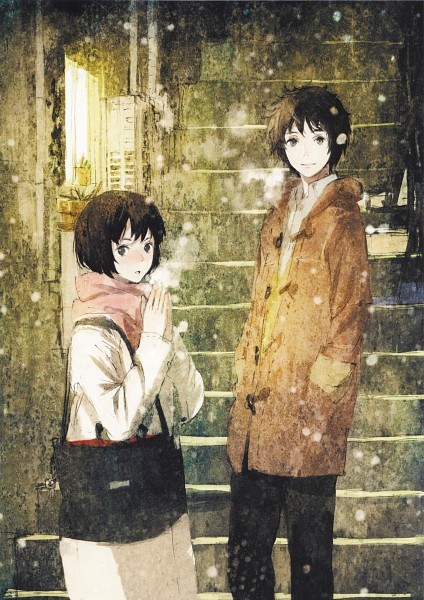
All of these elements caught my attention considering that the original novel began to be written in 2003 (the story is based on the "future" period of years between 2013-2017), and linking the neuroqueer representation present in the work, which was most likely also given unconsciously by the author (since under old paradigms in other cultures, neurodivergence was interpreted as a "personality type" and was made invisible), makes me remember in an analogous way the old diagnosis of Asperger Syndrome, which historically speaking also had a controversy for being considered ableist and "separating" autistic people based on whether they were more capable and potentially productive for society or not. These two characters had the future in their hands, since within their individual peculiarities, they were brilliant students, just what this modern city and in search of absolute control of its population, was seeking to enhance for its own benefit.
I really recommend this anime and manga to those who like dystopian novels or want a first approach to the genre, I assure you that in more than one aspect it will make you think about many social problems that are present in our tangible reality in almost the same way.
-Alejandra Lermanda
0 notes
Note
Ultraman Tiga is the perfect encapsulation of what Ultraman is meant to be. Dare I say even more so than the first season in '66, and even Ultraseven in '67.
Tiga has a rich atmosphere and consistent tone that accurately depicts the fears and hopes of the rise of the digital era in urban Japan of 1997.
It has commentary on the militarization of non-military government groups. It has deep questions about cohabitation on Earth when so little is being done to stop climate change, war, and xenophobia. It predicts and ponders what technology may do in the near future to both bolster and potentially collapse the human race.
The show puts science fiction and mystery back into the plot. Kaiju and Seijin aren't just setpieces for action but a rebellion of the earth's ecosystem, or a mimicry of what could happen to humans, or the strangeness of the unknown.
The music is iconic. It's synthy. It has your standard ultraman-pep, but something feels slightly more serious about it. Take Me Higher and Brave, Love, Tiga are GOAT Ultraman themes.
The creature designs. FANTASTIC.

Gatanothor, the Great Darkness

Kyrieloid, the Infernal Warrior

Bizaamo, Artificial Life-form
And Tiga himself? Iconic design. Simple. Unique. The first titular Ultra to have more than red and silver on their body. AND introduced type-changing, which forever altered how Ultras fight.

The character development is wonderful in this series. Every member of GUTS gets 3+ episodes of development each, as well as time to flesh out their families and outside life. First female captain of an attack team, too! The internal politics of TPC vs. GUTS is intelligent but still fun. Side characters make surprising and entertaining returns. One of the largest casts in an Ultra series at its time.

One thing that I just adore about Tiga is the undercurrent of hope throughout. It's about facing human struggles and coming out stronger. The late 90s/early 2000s had a lot of *edgy* toku content, and this was like a little, bright, heroic star in the midst of all that ✨️
Personal favorite episodes:
Ep 3. The Devil's Prophecy
Ep 13. Human Collecting
Ep 22. A Fog's Coming
Ep 31. The Attacked GUTS Base
Ep 37. Flower
Ep 44. Inheritance of Shadows
Ep. 50-52 (Trilogy Finale)
(And yes, I have a tv-prop quality replica of the Spark Lens)
Favorite tokusatsu franchise?
Ultraman.
So much Ultraman.

If you ever need an infodump, please ask me to talk about Ultraman
102 notes
·
View notes
Photo

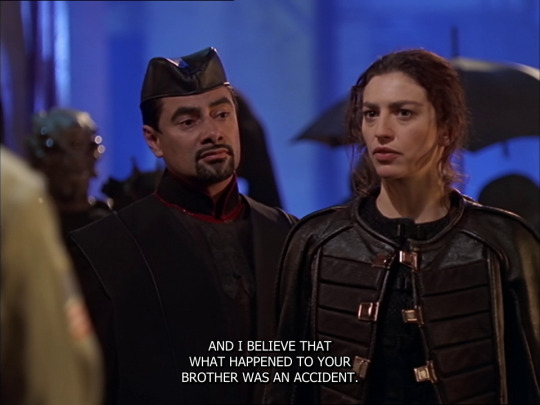



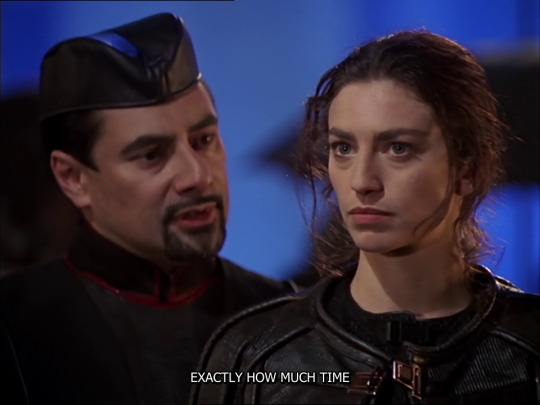



Here it is - the moment my heart switches from like to love, for Crichton and the show, on every rewatch.
It is such a little moment. Aeryn and John escaped and Aeryn made contact with Crais, her superior officer. Of course, neither John nor Aeryn know that Crais wants to kill John because of the accident which killed Crais' brother (And this is so the Farscape ethos - John is doomed and hunted for a moment of pure bad luck that happened the moment he ended up here, a moment he did not know about and cound do nothing to change. As he said in a much later episode, they’ve basically found the map to the cruelty of the universe.)
And there is the scene. John is captive, peacekeeper guns all around him. Crais circling him like his personal piece of property (Poor John. This is only a start. This is not the Aurora Chair, not Grayza, not Scorpius, not Scarrans, not Harvey). John watchful and realizing the wrongness (and OMG his innocence breaks my heart) and Crais telling him he'll dissect him. And Aeryn speaking up and telling Crais (and I love this. She didn't have to say anything. She didn't have, she should know it's a risk in such a society) that she didn't believe John was capable of killing Crais' brother because he is not intelligent or brave enough. And Crais, crazy Crais, fixating on her and asking her in this tone 'just how much time did you spend with this human?' And. And. And. This is the moment I fell in love with John Crichton all over again. He gives this quick, intense glance at the situation and he speaks up (to Crais), quietly and a little bit desperately: 'Not much, not much at all.' Why? It's so hard to put into words. I think because in the middle of all this (where there is the probability of him being killed in a gruesome fashion) he speaks up for Aeryn automatically, without the second thought. Maybe because even though as an alien he has no idea what is going on, he catches on so quickly, judges it so quickly, recognizes the danger to her, before she does herself. Maybe it's the seriousness, and the intensity, and the reassuring little nod he gives to her. Even utterly helpless himself, he tries to save Aeryn. This Crichton is not yet the Crichton that will literally turn the galaxy upside down to save the woman he loves, not someone who will make impossible choices and bear it all, but it's all in there already, all the qualities, and you can see that. In a way, knowing how all of these people will end up makes it even more delicious. Seeing Crais, all neat and orderly, before he went so crazy and AWOL (and his dishevelment definitely paralleled his fall from grace) and way before he redeemed himself. Seeing D'Argo as a self-concerned, immature, angry being. Seeing Aeryn as Peacekeeper Aeryn Sun, not a complex evolving human being yet, not a woman, not a being of her own will. But the seeds are still there. I cannot imagine other peacekeepers speaking up for John, trying to save him a bit. When John says 'You can be more' that is the thing. There is a 'you' in her to be more. There is something to start with. She has a soul that is not warped past return. And the chemistry between the two? Amazing. Even in this first ep, where they are nothing more than reluctant allies at first, disdain on her part and confusion on his. Btw, that first meeting? I love it love it love it so much. I watched 'pilot' after I've seen S4 and I remember going, as Aeryn threw him against the bulkhead and hit him and then demanded his rank and serial number. 'John, meet the future mother of your child.' Heh. God. It amazes me how far the two will come and yet how organically. And it's so true about all the relationships. Watch D'Argo and Crichton interact here: the anger on D'Argo's part the 'he is crazy' on John's. They don't even tolerate each other and yet by the end they are the best of friends. I love that Farscape, even though its romantic relationship was so crucial (didn't David Kemper or someone describe Farscape as a 'love story') also had all these incredible, well-developed, organic, fascinating other relationships: friendships, familial. Another thing I love? John saves the day with his brain. God, how much do I love that. He is a scientist, not a military guy, not a 'space jockey' like his Dad. He is a scientist. And that is why he can never get used to collateral damage, to killing, no matter how much of it he does, he is forced to do. And the show never forgets that. Farscape is one of those rare fictions (because I am not just talking about shows, but movies and books as well) where I do get convinced that John is indeed brilliant. And that he loves the science, he loves discovery, he loves the work. Despite wormholes being tainted so much with everything else, he is genuinely excited, involved in working on them. I keep remembering the S3 finale where even though he is pretending to work for Scorpius, he can't help but get into it, where equations literally pour out of him in scribbles everywhere, on windows, on pieces of paper, writing on his own arms. John is an obsessive. Here it is yet small: he wants to prove his theory. And even in the middle of the escape he is excited that it's proven. His obsessiveness will of course be brought out spectacularly by his stress later on, and his feelings, but it's already here. But to get back to what I was saying: I just love that he gets to win with his brain. And that is consistent. Because that is why he becomes the defacto leader of Moya. Not his amazing fighting prowess. He becomes quite competent in the later seasons, but he will never be pure warrior the way D'Argo or Aeryn are. It's his brilliant, crazy, completely creative plans. That, and the power of his conviction. John's conviction is an utter, absolute, contageous thing. It's not brought out fully yet, but I am struck by the foreshadowing of when he tells Aeryn to come with them, tells her she can be more, changes her life. It's the same conviction that will later have him walk into a Scarran station, unarmed, most wanted man in the galaxy, to get Aeryn out. And getting the Moya crew to come with him. But then, all of John is already here, just not forced to the surface yet. His crazy humor as way of coping with the insane universe about him. The core of steel (he is lost and dazed in this new word which is great because he is in a way proxy for the audience, but he doesn't bend before D'Argo e.g. and he is adamant to D'Argo about taking Aeryn with them or no one escapes), the inner decency and basic kindness (that kindness will be almost beaten out of him but shadows will always remain) when he tapes up the broken eye-stalk of the DRD - “merely” a mechanical critter on Moya. Oh. GUH.
@mousieta I am so glad we are doing this!
39 notes
·
View notes
Text
The Dos and Don’ts of Writing Smart Characters
Since I started this blog, one of the most common questions I’ve received has to do with the portrayal of intelligent characters. This is also one of the most difficult to answer -- excluding questions about characters with specialized knowledge sets, which are fairly easy to answer with source compilations. Most of the questions have to do with: how do you portray a smart character believably? How do you make the audience relate to them? Can I still make them likable? How do I avoid the pitfalls of popular media?
Well, I’m finally here to answer, utilizing examples from some of my favorite (and occasionally, not-so-favorite) media. Let’s jump in to the dos and don’ts of smart characters!
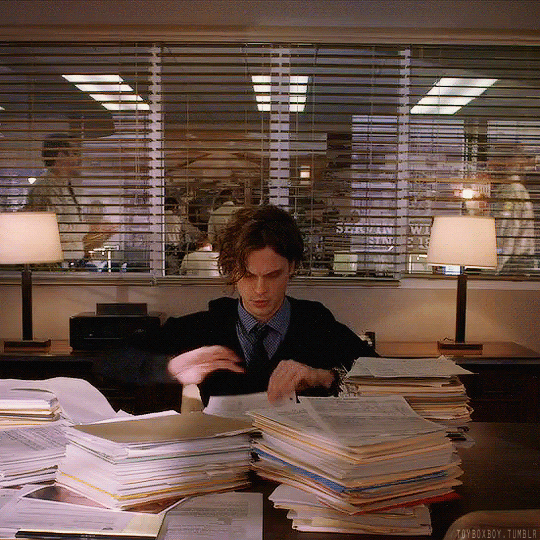
1. Do let the audience follow the character’s thought process.
As demonstrated by: Tommy Shelby from Peaky Blinders
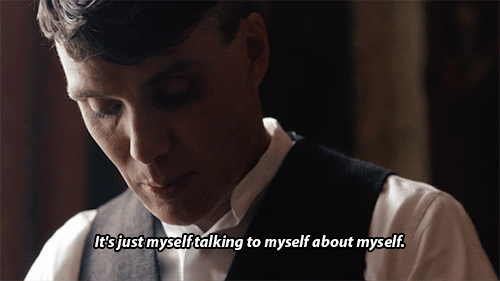
Albert Einstein allegedly once said, “If you can’t explain it to a five-year-old, you don’t truly understand it.” And the sentiment rings true: true genius doesn’t need to dazzle with big words and technobabble. Instead, it makes the complex appear simple.
The same rings true for brilliant characters. BBC’s Sherlock (more on that later) ceased to satisfy in its later seasons because it began to rely too heavily on visual glitz to avoid actually explaining its mysteries and how they were solved. Similarly, the biggest complaints with block buster franchises -- Star Wars, The Avengers, Game of Thrones -- is that they became obsessed with “subverting expectations” cleverly instead of leading the audiences to their most logical and satisfying conclusions.
Meanwhile, the smartest and most satisfying media dazzles not by staying over the audience’s head, but by illustrating how simplistic the solutions can be.
Let’s start with my boy Tommy Shelby, the charismatic, swaggering protagonist of the charismatic, swaggering crime drama Peaky Blinders. Using only his intelligence (and complete disregard for his own life/suicidal tendencies, but that’s not the point here), Tommy claws his way up from the near-bottom of the social ladder (an impoverished Romani in early 20th century Birmingham) to being a decorated war hero, to being the leader of a feared razor gang, to dominating the race track business, to becoming a business mogul, to becoming a member of parliament and trying to assassinate the leader of the fascist party. He’s also one of the paramount reasons why I’m bisexual.
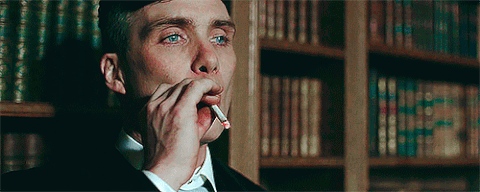
So how can such a drastic social climb be conveyed believably? Because Tommy -- as the viewpoint character -- is placed in seemingly inescapable situations, and then proceeds to demonstrate that the solutions to those situations have been there the whole time. I recently watched a brilliant video on how this is done, which can be viewed here.
Early in season one, for example, he responds to aggressive new methods by the police by organizing a mass-burning of paintings of the king, and uses the press this garners to publicly shame the methods of the chief inspector who’s been antagonizing him. In the next season, he talks his way into a deal by bluffing that he planted a grenade in his rival’s distillery. My personal favorite is in season four, when he responds to being outgunned by a larger, American gang by contacting their rival -- none other than an Alphonse Capone.
All of Tommy’s victories are satisfying, because they don’t come out of nowhere -- we have access to the same information he does, each victory is carefully foreshadowed, and we are reminded at every turn that failure is a very real possibility (more on that later.) So when he wins, we’re cheering with him.
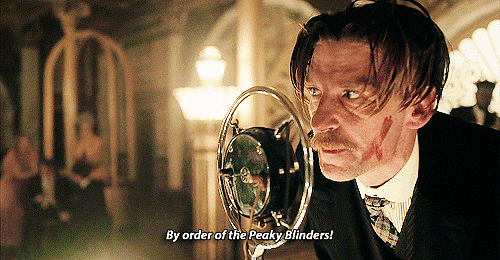
Other examples: Mark Watney from The Martian, who explains science in its most simplistic terms and with infectious enthusiasm. He would make every character on The Big Bang Theory cry.
Also, Miss Fisher from the AMAZING Miss Fisher’s Murder Mysteries. The dazzling, 1920s, female Sherlock Holmes of your dreams. I cannot recommend it enough.
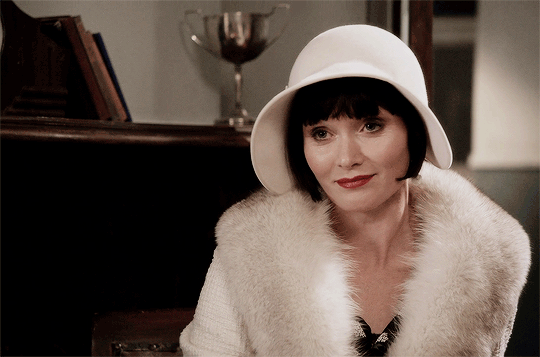
To apply this to your own writing: Remember you won’t dazzle anyone if you smack them in the face with a “brilliant” plot twist. They want to take a journey with your character, not be left in the dust.
Also, for everyone in my askbox concerned that they’re not smart enough to write intelligent characters, just remember how simple the problems confronting smart characters can be. Put them in a difficult situation, and provide them with a means of getting out. Then, just let them find it.
2. Don’t assume the audience is too stupid to keep up (or try to make them feel too stupid to keep up.)
As demonstrated by: Sherlock Holmes from BBC’s Sherlock.
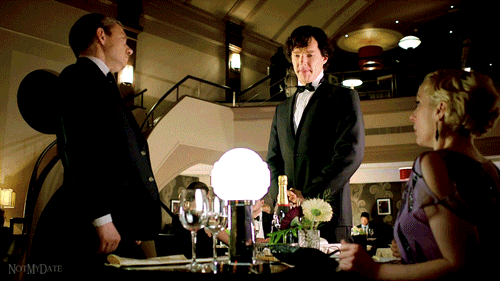
Say what you will: there were reasons why everyone was so captivated by this show during its first two seasons. It felt fresh. People had yet to become frustrated with the inescapable thirst for Benedict Cumberbatch. The writing was sharp, and the editing clever. And it wove a tantalizing web of mysteries that demanded solution. The problem was, there weren’t any.
The most frustrating for many was how Sherlock faked his death at the end of season two, after which devoted fans spent two years creating intricate theories on how he might have pulled this off. The creators responded by mocking this dedication in the opening episode of season three, by showing a fan club spinning outlandish theories (one of which included Sherlock and Moriarty kissing.) This might have been laughed off -- at the time, many seemed to consider it quite funny -- if the creators had bothered to offer their own explanation of how Sherlock survived. They didn’t. And so began a seemingly endless loop of huge cliffhangers that promised -- and consistently failed to deliver -- satisfying answers.
The most egregious examples occur in season four, which provided answers to questions no one asked, and withheld answers for things everyone wanted to know. For example, did you know that the real reason Moriarty engaged Sherlock is because he was hypnotized by Sherlock’s secret evil sister? The same one who killed Sherlock’s best friend, whom Sherlock convinced himself was a dog? Yes, that was a real plot point, in the climax of the series. It’s an effort to befuddle the audience with brilliant and unexpected writing, but instead pulled them out of a story they were already invested in and made them far more critical of its pre-existing faults.
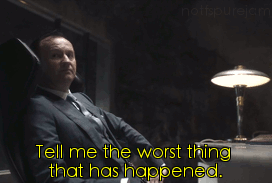
It’s pointed out in the brilliant (if bluntly named) Sherlock Is Garbage, And Here’s Why that Moffat can be a great writer, but is a consistently terrible show runner, because he’s more interested in dazzling the audience with cleverness than actually telling a satisfying story. The video also points out that the show often implied Sherlock’s brilliance, without ever letting the audience follow along with his actions or thought-process in a way that DEMONSTRATED his brilliance.
I highly recommend giving the aforementioned video a watch, because it is not only a great explanation of how Sherlock Holmes can be best utilized, but about how writing itself can be best utilized.
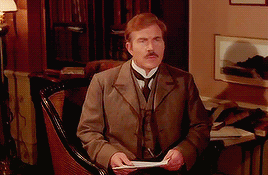
Other examples: The Big Bang Theory. As Wisecrack points out in their wonderful video on the subject, the punchline of every joke is “oh look, these characters are smart nerds!” which is repetitious at best and downright insulting at worst.
How to avoid this in your writing: Treat the audience as your equal. You’re not trying to bedazzle them, you’re trying to take them on a journey with you. Let them be delighted when you are. Don’t constantly try to mislead them or hold intelligence over their head, and they will love you for it. Also, cheap tricks do not yield a satisfying story: readers will know when you went into a narrative without a plan, and they won’t appreciate it.
3. Do remember that smart people can be kind and optimistic!
As demonstrated by: Shuri from Black Panther.
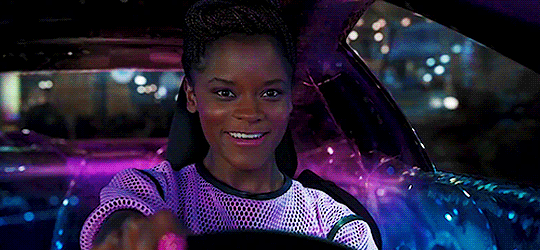
Yes, brilliant people can be unhappy and isolated by their intelligence, or rejected by society. But remember that intelligence isn’t synonymous with a cantankerous attitude, or an excuse to be a pugnacious ass to those around you!
Part of the reason why Shuri of 2018′s Black Panther was such a breath of fresh air was the fact that she subverted almost all preconceptions about how a genius looks, acts, and regards the world. And it’s not just the fact that she isn’t a sullen, middle-aged white man that makes her stand out: Shuri has an effervescent attitude, and genuinely loves contributing to her country and family. She referred to sound-proof boots as “sneakers” (and then explained the pun when her brother didn’t get it.) She’s fashionable. She teases her older brother, and cries when he is apparently killed. She’s up on meme culture. This makes her unlike pretty much every other genius portrayed in the MCU.
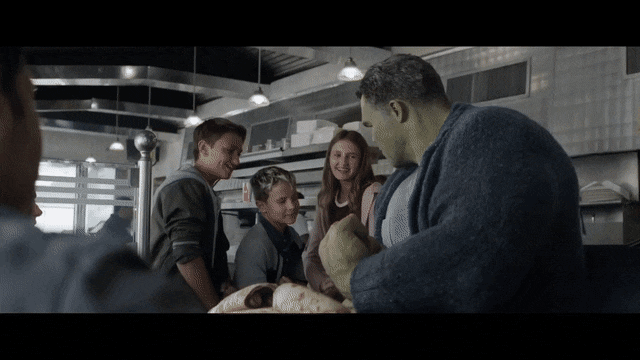
Except maybe the Hulk. He can dab now.
Shuri is also allowed to take pride in her genius, and can be a bit insufferable about it, which makes her more enjoyable and rounded. But she is an excellent example of how genius can be explored and portrayed in fiction, and I will forever be embittered that she was underutilized in Infinity War and Endgame.
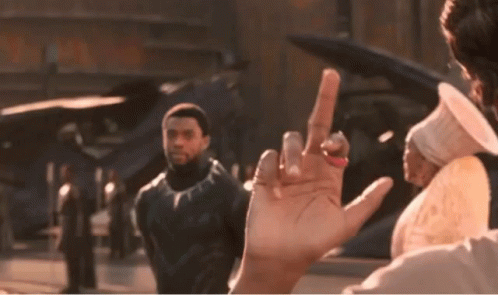
Why, for example, are all geniuses portrayed as arrogant misanthropes? Albert Einstein battled depression, but he is also said to have enjoyed blowing bubbles and watching puppet shows. He was kind to those who knew him. Similarly, Alan Turing behaved little like his fictional counterpart, described as “shy but outgoing,” with a love of being outdoors. Nikola Tesla fell in love with a pigeon. Why do we have to portray these people so damn gravely?
Other examples: Spencer Reid from Criminal Minds. Also an excellent portrayal of an intelligent person on the autism spectrum, as he struggles to interface socially but cares profusely for his fellow human beings. He is brilliant, and completely precious.
Also, Sherlock Holmes -- the original version, and all faithful adaptations thereof. Anyone who thinks Sherlock is an austere, antisocial jerk isn’t familiar with the original canon. He blushed when Watson complimented his intelligence, for God’s sake.
Then there’s Elle Woods from Legally Blonde and Marge from Fargo. Brilliant, upbeat, optimistic geniuses.
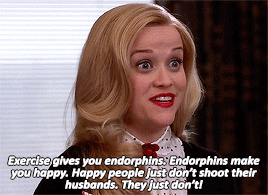
To apply this to your own writing: If you have a smart character who hates everyone around them for no identifiable reason, ask yourself why this is necessary and what this adds to the plot. Are they angry about injustice, towards themselves or others? Are they frustrated with an inability to relate to people? Do they want to protect themselves or their family at all costs, including politeness? If not, question why your brilliant character can’t also be kind to those around them.
4. Don’t make your character perfect at everything they do.
As demonstrated by: Wesley Crusher from Star Trek: The Next Generation.
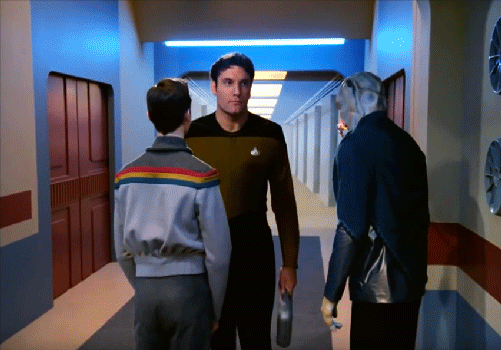
Ah, Wesley. Some call him the original Mary Sue, and it’s one of the only times I’ve seen the term applied with some accuracy. He is somehow the most gifted and least qualified person on The Enterprise. He’s Hermione Granger without the charm, jumping in to answer questions before any of the trained officers in the room have the chance to, always in the right. His only obstacle? Why, the boorish adults he’s surrounded with simply don’t understand his brilliance!
As early as the series’ very second episode, Wesley -- inebriated by an alien illness -- forcibly takes over the ship from Captain Picard, only to later save it from a threat with a reverse tractor beam of his own design.
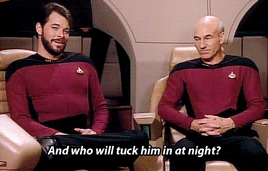
Wesley was obviously inserted as a means of attracting younger viewers, but failed egregiously, because he was too annoyingly perfect for kids to relate too, and not cool enough for them to be invested in. I binge-watched the various Star Trek series in my youth for Spock, Data, and my wife Seven of Nine, not to watch seasoned military and scientific officers get lectured by an adolescent. Even Wil Wheaton, who had the misfortune of portraying this character, expressed a dislike for him.
Precocious children are great, if you get them right. But get them wrong, and they can easily become your most annoying character, marring the face of otherwise great media. The most important thing you can do for a brilliant character is endow them with weaknesses and flaws -- even something as small as Shuri’s fondness for teasing her older brother made her enjoyable, as anyone with siblings could relate to their dynamic.
But, what if you want a supernaturally talented character who not only fails to be a ray of sunshine, but is something of an arrogant, antisocial jerk? Can they still work, especially if they also happen to be a child?
Yes, under one extremely important condition:
5. Do keep your characters out of their depth!
As demonstrated by: Number Five from Umbrella Academy.
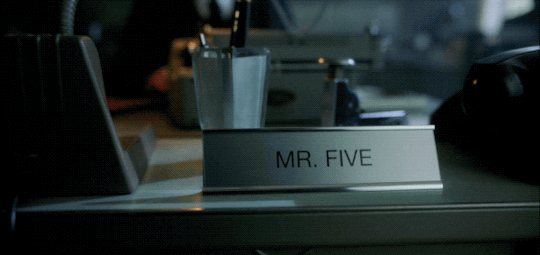
Okay, he’s not exactly a child. He’s a fifty-eight-year-old trapped in a child’s body, who’s traveled back in time from a post-apocalyptic future to warn his siblings of an incoming Armageddon. In other news, Umbrella Academy is a weird show. Unlike the comics, however, the apes don’t engage in prostitution.
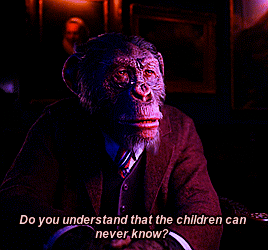
The effect, however, remains the same: a preternaturally talented child who talks down to everyone around him, including his (apparently) older siblings. So why does he work while Wesley fails so egregiously?
For one thing, it’s demonstrated early on that Five has the skills to back up his sanctimonious attitude, with the delightfully ultraviolent Istanbul (Not Constantinople) sequence. It also helps that he lacks Wesley’s squeaky-clean moral code, to the point at which he can get drunk in public or kill without remorse.
But: the element most vital to his success as a character is the fact that he’s kept completely, and consistently, out of his depth. He knows the world will end in eight days, but he doesn’t know how this will transpire or how to stop it. Ultimately, he fails again to stop the apocalypse, and must travel back in time with his siblings for another chance.
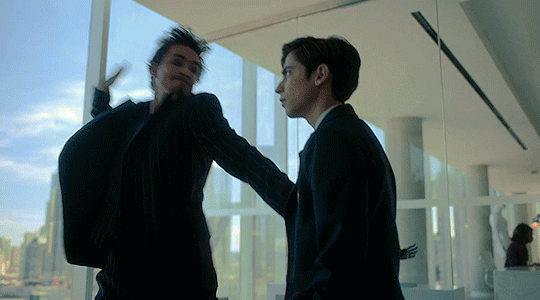
Most authors have the impulse to demonstrate a character’s brilliance by allowing them to succeed against insurmountable odds, but the Umbrella Academy writers show tremendous wisdom in allowing Five to fail. This allows the audience to empathize with him, and countermands the effects of his arrogant attitude.
This advice isn’t just true for pint-sized prodigies. Look back over this list, and take notes of how often the most successful characters are allowed to fail, to have flaws, and to ascend past their comfort zone.
Other examples: Virtually every successful example on this list.
Tommy Shelby, a character of limitless ambition, conducts a new, perilous climb outside of his social rank each season, which almost always puts him in positions of mortal danger. He faces threats both external (rival gangs, evil priests, and rising fascists) and internal (hello PTSD, suicidal tendencies, and crippling addiction) but either way, we understand that his fast-paced climb is not for the weak-willed or faint-hearted.
Mark Watney is a brilliant scientist who has been stranded in an utterly impossible situation for which absolutely no one could be adequately prepared (spoilers: it’s on Mars.) We are drawn in by his plight, and how he could possibly escape from it, and there we come to admire him for his courage, optimism, and humor.
Shuri, though not the main character of Black Panther, is allowed to show off both tremendous gifts and vulnerability, as she is powerless to stop the apparent death of her beloved older brother. She watches Wakanda’s takeover both as an innovator and a young woman, and a large reason for her success is that she is allowed to be both.
How to apply this to your writing: When portraying intelligent characters, take stock of how often they fail, their level of control over their surroundings, their vulnerability, and their flaws. We don’t want to read about flawless deities. We want to read about characters who embody and personify our humanity. So remember they need to fall down in order to pull themselves up.
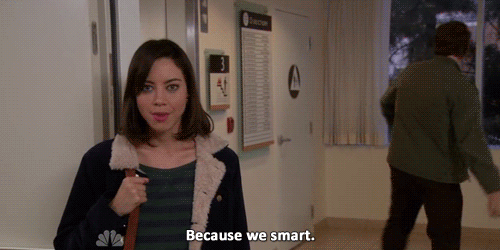
Happy writing, everybody!
#long post for ts#writing tips#writing smart characters#peaky blinders#tommy shelby#mark watney#the martian#miss fisher's murder mysteries#shuri#black panther#spencer reid#criminal minds#legally blonde#fargo#number five#the umbrella academy#star trek#star trek: the next generation
922 notes
·
View notes
Text
Dig a Grave to Dig Out a Ghost - Chapter 5
Original Title: 挖坟挖出鬼
Genres: Drama, Horror, Mystery, Supernatural, Yaoi
This translation is based on multiple MTLs and my own limited knowledge of Chinese characters. If I have made any egregious mistakes, please let me know.
Chapter 1 Chapter 2 Chapter 3 Chapter 4
Chapter 5 - Expert
The subsequent calm was something Lin Yan wasn't expecting. The thing seemed to have decided it tortured him enough and nothing else happened the rest of the night. Lin Yan changed back into his clothes and unplugged his computer. Even though he knew that that probably wouldn't do anything, the screen actually powered off and didn't come back on at all in the night.
Perhaps a new storm was brewing in the silence, but Lin Yan was too exhausted to worry about it. The alcohol that was left in his system worked as a great tranquillizer, and he rolled over and fell asleep.
While he was deep in sleep, something cold pressed itself on his lips again, but Lin Yan was too much a heavy sleeper to realize it.
When he woke up, the entire room was clean. All the red paint had disappeared, the light gray printed wallpaper and the screen wall painted by the students of the Academy of Fine Arts were intact, and the glass was spotless. There was no other evidence to prove that the absurdity of last night had ever happened except for the shameful traces of liquid on Lin Yan's body and clothes. He took a bath and threw the red clothes into the washbowl. Compared with the power of the invisible thing, he was clearly at a disadvantage. Instead of running around without a plan, it was better to observe what happens as things unravel.
After he finished packing things up, Lin Yan took out his phone and texted Yin Zhou about the meeting place. Unexpectedly, he got a reply almost instantly: See you at the school gate in half an hour.
Lin Yan looked at himself in the mirror. Within just two nights, he looked like he had been doing drugs for years, he had a scruffy stubble growing, and his eyes were red. The mint scent of his shaving foam made Lin Yan feel for the first time that his typically monotonous life was actually so much more beautiful than that. The blade was thin and sharp. Just one long stroke across his neck and there would be nothing left.
Humans were such fragile creatures.
"Shit. . ." Lin Yan hissed, sighing at his unfortunate luck and put his fingers under the water. His hand had slipped and he sliced his fingertip on the blade, red blood seeping out. Lin Yan wrapped a bandaid around his finger, leaning against the wall and pondering about how unlucky it was to feel the pain.
He didn't know what kind of dye was used on the funeral clothes, but it had bled dramatically in the water. After a while, the whole basin of water had been dyed red. Lin Yan glanced at it in disgust as he left and slammed the door shut.
At 8 o'clock, Lin Yan saw Yin Zhou holding a Scallion pancake and some fruit in front of the school gate.
The two of them regretted trying to drive. The roads were clogged with morning rush hour traffic to the point that they couldn't even see the end of the lines of cars. What genius designed this kind of urban roundabout? Five ring roads surrounded the main road and they were forced to convene together every morning and night.
Lin Yan and Yin Zhou were nearing the third ring road and they still didn't have any temper, so all they could do was turn on the radio and eat the breakfast that Yin Zhou brought.
"A 13-year-old boy from a remote village in Sichuan was found hanged at home wearing a red coat. The locals suspected it was most likely cult-related. It is reported that the boy's time of birth and time of death are both extremely negative times and very suitable for. . ."
Lin Yan snapped the radio off.
It seemed that everything in the world had been messed up overnight. Even this kind of unreliable news could be relayed to the public.
Yin Zhou didn't care. He swallowed the last bite of his pancake and hiccuped. He said with satisfaction: "I spent the rest of the night in the library. I was starving and I couldn't buy anything. It's great to feel full."
"There was no exam recently, what were you doing at the library?"
"I was studying the enemy's intelligence. This enemy works in the dark. Can we defeat it if we understand how it operates? What do you think, buddy?"
Lin Yan turned his face to look at the crowded traffic outside the window. He stayed silent for a while before he said softly, "Do you really believe that there are ghosts in this world? I feel like something is wrong with me. Maybe I should see a psychiatrist first."
Yin Zhou's eyes widened in surprise: "Come on, even if something's up with you, I'm totally normal, yet we both saw those clothes yesterday."
". . . At your house the day before yesterday, I was the only one who thought it was cold, and I was the only one who could feel ‘it’ in the house."
Lin Yan sorted out his thoughts and told Yin Zhou his experience of being choked by someone last night.
Lin Yan wasn't expecting it but Yin Zhou exploded after hearing this, and blurted out: "Fuck, that ghost was a rabbit master* during his lifetime?" He scanned Lin Yan's face over and over again: "Little Brother Lin, don't tell me. . . you can be considered a nice-looking guy if you look closely. He's dead and maybe he's lonely and wants to recruit you as his wife."
*because they would kill the rabbit by snapping its neck
"Fuck you. If you aren't going to be serious, get out of my car and leave. Don't forget to burn two boxes of condoms for me when I croak." Lin Yan said quietly. The car behind him honked its horn twice, and Lin Yan realized that while he was talking, a 5-6 metre gap had cleared in front of him. He hurriedly followed the line of traffic.
"Furthermore, in the middle of the night, I obviously saw that the whole house was covered with red paint, but in the morning there was nothing. It was as if I had been dreaming."
Yin Zhou dragged the backpack out of the back seat and hugged it in his arms. He said, "Hey, let me show you the results of my brother's research." As he talked, he opened his bag and took out a dozen crumpled papers from it and spread them out on his knees. He flattened them with his hands and started going over them from top to bottom.
"You can't take care of shit. I feel uncomfortable just looking at those."
"See, the attributes of a wife. This ghost saw it perfectly."
A grass mud horse roared and ran across Lin Yan's heart.
Sure enough, these geeks are something else.
"Listen carefully." Yin Zhou pushed up his glasses with his long fingers: "There are generally two modern interpretations of ghosts. The first is due to the discovery of dark matter. You know the law of conservation of energy?"
". . . Go on." Lin Yan gave him a blank look.
"The universe expands at a certain rate every year. If the law of conservation of energy goes as normal, where does the energy that supports the expansion of the universe come from? According to this question, modern physics puts forward the concept of dark matter and dark energy. It does not generate electromagnetic waves, cannot be sensed, and cannot be measured. The law of gravity estimates that dark matter and energy account for 96% of the mass of the universe, and the remaining 4% is what humans can now recognize."
"Many unexplainable phenomena are therefore attributed to the results of dark matter, such as meridians in traditional Chinese medicine, the power of the mind, and ghosts. There are many discussions on this field abroad, but it is obviously blocked in China and difficult to find." Yin Zhou spread out his hands.
Lin Yan nodded. This was a bit like a science fiction novel he had read once.
"And the second one?"
"The second type is attributed to electromagnetic waves. The environment in which the deceased died is not conducive to electromagnetic wave attenuation. The powerful thoughts it had before death form a unique energy field. If a person's own frequency is similar to it, it will resonate when they come into contact. The waveform of the original ghost is greatly strengthened so then the two can sense each other."
Lin Yan was stunned: "You mean I. . . resonate with the ghost?"
Yin Zhou said indifferently that it was possible. He turned and smiled mysteriously: "Do you know how to explain love at first sight using electromagnetic fields?"
Lin Yan's heart stuttered.
"It's just resonating. It's the same with both men and women."
Yin Zhou sighed: "I don't want to fall in love for a while. It's boring, it's like a ghost."
The cars finally started moving again, and they finally got off the third road ring after being stuck for three hours. Lin Yan turned on the navigation and stepped on the accelerator to hurry towards the destination.
He always thinks that love was just like a ghost; he didn't believe in either. He only understood the panic and anxiety he felt when he encountered it, but he has never imagined that ghosts were also like love, triggered by a specific reason in a specific environment and dragged forcibly into the abyss, unable to escape.
"Have you been in touch with anything special recently, or have you been to anywhere special?"
Lin Yan thought about it for a moment and shook his head: "No. Every day I'm in the study room, tutor's office, library, home, cafeteria, there's nowhere else. But I have come into a lot of contact with lots of things from several dynasties."
Yin Zhou clumped the pile of information in his hand, and put it into back his backpack despite Lin Yan's contemptuous eyes, and clicked the buckle shut.
"Impossible. The electromagnetic waves would have decayed early in a small object, even if the Maoshan technique was used."
A thought suddenly flashed through Lin Yan's mind.
"There was this one place. . .Last month, my old man arranged an internship position for me on an archaeological team. It was a tomb with small specifications. I was there for less than a week."
Yin Zhou's eyes lit up all of a sudden: "There's this show, we should wait and check it. . . what the fuck!"
Lin Yan slammed on the brakes. Yin Zhou's head slammed into the windshield with a bang, and he wailed in pain.
"What are you doing?! Braking like that is going to kill you. What if we got rear-ended?!"
Lin Yan looked at the empty windshield in shock. He pulled the car over and, when he turned to Yin Zhou, his face changed.
"You. . . didn't see that just now?"
"What!" Yin Zhou took off the glasses that had been knocked off-kilter, trying to push them into their original spot, and couldn't help complaining in grief.
"There was a hand. . . stretching down from the roof of the car."
Yin Zhou was stunned and looked up at the window glass cautiously. A truck came up from behind, went around their car and drove on.
Lin Yan was too scared to speak for a while. He recalled the stiff white hand that had slapped on the windshield from the roof of the car just now, but it disappeared in a blink of an eye. There were speeding trucks or tankers everywhere on the sixth ring road. He opened his mouth and looked at Yin Zhou. The other party understood his thoughts immediately. Yin Zhou took a breath and hesitated: "Then this thing. . . it wants a human life."
Lin Yan shook his head. He always felt that there was some motive behind everything that had happened, but he couldn't say it out loud.
They drove out of the city in a blink of an eye. The endless rows of poplar trees and the green border fields in the suburbs relaxed the tension of the two people in the car a lot. Lin Yan rolled down the car window, and the car air mixed with the fragrance of flowers and plants that poured in. Inside the car, the stuffy scent of the pancakes was blown away.
After the twist and turns the GPS took them on, the car turned onto a rugged path paved with stones. The surrounding buildings were replaced with independent bungalows and small farmyards. A yellow dog squatted on the steps and stretched its neck. Some hens gathered in groups lazily together. Every now and again, they passed by a white goose on the side of the road. Lin Yan slowed down and stared at the map displayed on the GPS. He glanced at Yin Zhou distrustfully.
"If I keep going, I'll have to turn around to go back to the village. Did your mother send us to a reclusive expert?"
Yin Zhou leaned over to study the map, then turned his head in confusion and looked out the window. He happened to pass by a house, a yellow mud bungalow, with a faded couplet on the door. The old man in front of it only lost two front teeth, and he was leaning back to watch the excitement. . Yin Zhou scratched his scalp suspiciously: "The address my mother gave is at the end of the village, and she said it was amazing. Let me buy some tributes to bring with me. I can't do it alone."
So Lin Yan stopped the car when passing by the market, and bought two gifts according to Yin Zhou's suggestion. . . that bastard.
"Are you sure about all this?" Lin Yan looked embarrassedly left and right, carrying a live turtle in one hand and walking back, Yin Zhou happily pointed at the turtle's head and said, "What do you know? , These kinds of psychic masters rely on this stuff to keep up with their lifestyle. Trust me."
Lin Yan threw the two bastards into the trunk, took out a bottle of mineral water and handed it to Yin Zhou. He also opened a bottle for himself and took a few sips.
The country cicadas cried one after another, and the green wheat was headed; it was a wonderful scene of peace and prosperity.
Several children wearing red and green were squatting on the ground playing fan cards not far away. Lin Yan asked Yin Zhou: "What did your mother saw that name of the expert was? I'll ask around."
He couldn't help but imagine a scene of a bamboo hut with a mantle drooping in front of the porch. An old man in white with his hand stroked his beard and smiled slightly. He and Yin Zhou knelt forward on one knee, clasping their fists and begging, "Master, please guide me!"
Yin Zhou took a note from his pocket. He squinted at it, and said perplexedly: "Second Immortal Gu."
Before Lin Yan had enough time to swallow, all the water was spat back out.
"Ahem. . . is that so?"
In a small courtyard in the northeast corner of the village, Lin Yan and Yin Zhou found the legendary Second Immortal Gu’s house. When Lin Yan saw Second Immortal Gu's respectable face from outside the door, the regret in his heart was like torrential rapids. There was an enclave in an empty black room; he didn't know which god was being worshipped. An old woman in blue flower cloth sat cross-legged on the futon with her eyes closed and rests her mind. The red cloth strip that was tied to her forehead was quite imposing.
"This posture rivals some of the best dancers out there!" Yin Zhou pointed at the scene inside and couldn't help muttering softly.
"Come on, this is who your mother mentioned. Be respectful." Lin Yan said embarrassedly.
"What should we do?"
"Let's take a look first. Maybe the real person hasn't shown up."
Lin Yan and Yin Zhou walked through the door. Hearing the movement, the immortal woman lifted her eyelids slightly, and hummed from her nose aimlessly.
"Oh, ahem. . ." Yin Zhou couldn't hold back his grin and quickly concealed it with a cough.
What happened later was a farce. After receiving the turtle and two hundred yuan brought by Lin Yan, the woman suddenly became energetic. She worshipped the gods with incense and poured a bowl of clear water on Lin Yan while muttering words. After turning around Lin Yan more than ten times, she finally opened his eyes sharply. Lin Yan was so frightened by her that his body was shocked. The only thing she did was shout: "Aha! I saw it!"
"There is a little girl standing behind you!"
Lin Yan and Yin Zhou looked at each other, each holding their breaths.
"Oh, this baby girl died terribly. She said that she was locked up and could not be born. She didn't have money to buy clothes, and she didn't have money to pay her way through death. That's why she's gotten involved with you. . ."
"Wait, I'll ask her how to resolve this. . ."
The immortal woman closed her eyes and began to sing. Lin Yan pointed at the door to Yin Zhou and said: "Do you need someone to grease your feet, what are you waiting for?"
After reciting a long list of words, she opened her eyes and saw that there were no longer two other people in the room.
The immortal woman had no choice but to touch the newly collected two hundred yuan and shook her head, muttering that the young people nowadays are really impatient. Then she staggered around to pack her things up.
When she picked up the bastard turtle, she couldn't help but give a long sigh.
#dig a grave to dig out a ghost#dig a grave to dig out a ghost translation#chinese bl#chinese novel#english translation#yaoi novel
9 notes
·
View notes
Text
May 9, 2021: A.I. Artificial Intelligence (2001) (Recap: Part One)
Welcome to the future.

At this point, we’ve mostly looked at the past, present, or the near-future (as in, the next ten years, if that). Additionally, we’ve looked either at nonexistent technology in a contemporary setting, or an extension of existing technology taken to a logical next step. But no more. No more realism, no more real-world rules, and nothing that we’re even close to in this reality.
Well...mostly.
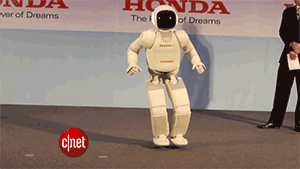
That’s genuinely impressive, not gonna lie. Anyway, yeah, from here forwards (for a bit), we’ll be looking at the future and futuristic technology. Now, there are a couple of ways in which these films tend to go. The first big way that we tend to represent the future in film is the same way we always have: flying cars, futuristic technology, smart houses, and robots.
Now, there are countless examples of this future, and it always changes a bit depending on the present. Which, yeah, makes sense. After all, what I’m doing right now, at this moment, would’ve been seen by many people as a massive technological achievement, even around the time that I was born. Which, yes, I’m old, deal with it (because I can’t). Anyway, the way that this begins is with the first major filmed view of a seemingly idyllic future: Fritz Lang’s 1927 film Metropolis.
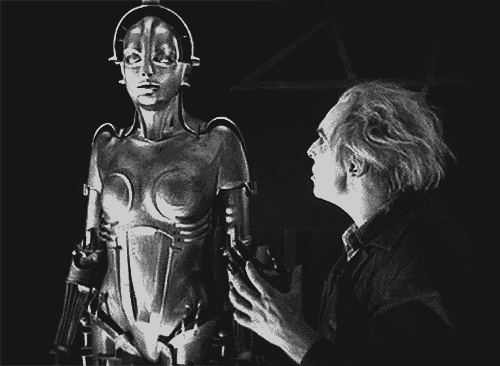
The overly mechanized (and politically dystopic) society seen in this film, as well as the visuals and technology, would inform our ideas of the future throughout the next century. Multiple themes and common objects reoccur throughout futuristic fiction. You know the stuff I’m talking about. Flying cars, automatic food machines, robotic assistants, video watches, holograms, jetpacks, so on and so forth.
But here’s the thing about the future. It’s always ahead of us, and eventually...well, we’ve gotten to most of those things to some degree. Either they already exist...
youtube
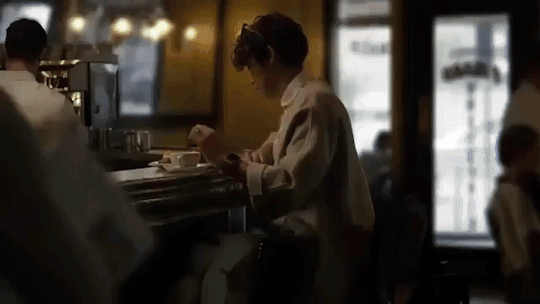
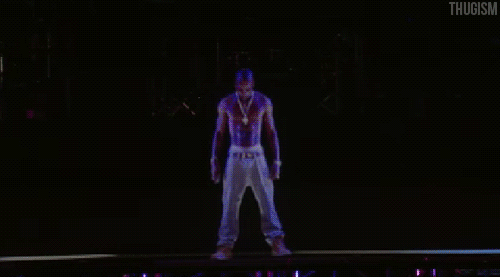
...or is currently being developed.


Well, one of them we’re still working on. And the development of more advanced AI is something we have yet to perfect, or even fully develop. However, the development of A.I. (and the consequences of that technology) are ALL OVER science fiction. Sometimes, they’re merely used for flavor to help establish the futuristic setting.
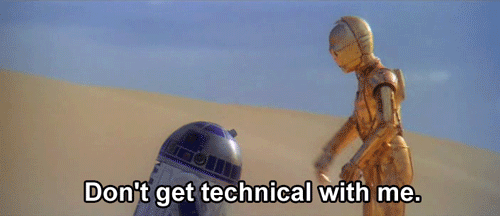
Sometimes, they’re characters with their own agency and conflicts, which may or may not define the plot. In these cases, they’re often simply there to back up the main human characters, and help with their development, and sometimes their own. You know, manic pixie dream robots.
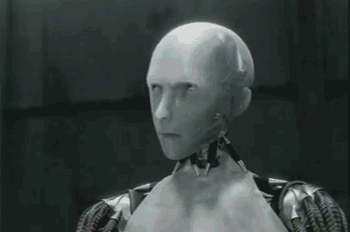
And then, possibly most often, they’re the abject villains of the piece. they can be mysterious alien technology, like in The Day the Earth Stood Still, or a man-made danger that turns on the race that created and/or abused it.


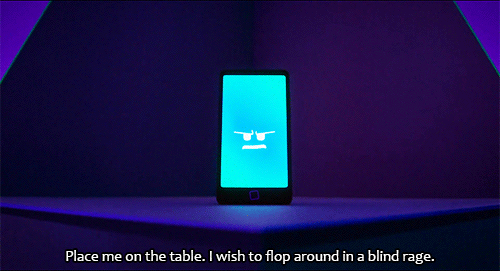
But then, on occasion, an A.I. is given the chance to develop as a character, without being used to define the development of a human character. Sometimes, the question of what life truly means is raised through these characters, and we become attached to them outside of any other character. This isn’t nearly as common as the others, but it’s definitely not unheard of.

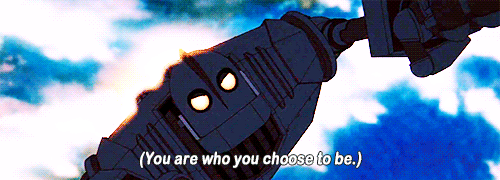

And for the record...things don’t often go well for those AIs. But still, some of those characters have quite a lasting impact. So, there’s quite a lot of potential for this type of character, from a dramatic standpoint. And that potential leads us to the guy who made this.
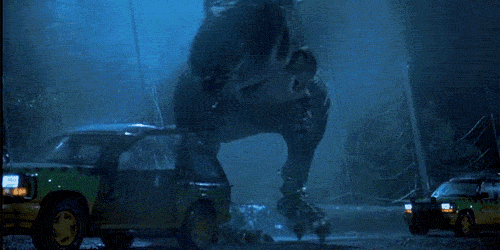
I WILL MAKE A JURASSIC PARK REFERENCE AS OFTEN AS POSSIBLE
Steven Spielberg gives us today’s entry, and this director of a classic science fiction story about science gone awry teamed up with the director of a science fiction film where an artificial intelligence went awry. You know, this thing.

I didn’t forget about HAL. And I won’t forget about him later, either.
Director Stanley Kubrick is pretty well-know for his mind-bending films, especially The Shining and 2001: A Space Odyssey. But he also worked with Spielberg on this film before his death in 1999, as this was one of his dream projects for many years, and the two directors were well-known friends.
And so, eventually, Spielberg was given the reins from Kubrick, and results were...mixed. It’s funny, because I’ve never actually seen this movie, but I remember it through its surprisingly widespread ad campaign. I used to go to NYC as a kid a lot, and there was a massive building-side plastered with the iconic logo of this movie. So, I’ve been hovering around this movie for a long time. Enough navel-gazing!
SPOILERS AHEAD!!!
Recap (Part One)
It is, unsurprisingly, the future. A marrator informs us that climate change has caused the ice caps to melt, and global flooding drowns several countries. You could say that it’s a...Waterworld.
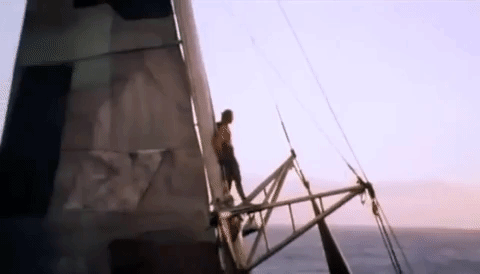
I genuinely considered watching that movie at some point, and then I decided I liked myself to much to watch 2 hours of Kevin Costner’s emotionless acting. Granted, it’s not much better now, listening to the emotionless acting of...
Professor Allen Hobby (William Hurt) is a straight-up sociopath. OK, technically, he’s a robotics engineer, but dude’s making a speech, right? He talks about how far robots have come, dissing my boi Deep Blue in the process, and notes that pain-memory response can also be demonstrated by robots. He proves this by stabbing a woman in his audience, like RIGHT through the hand. Jesus, man! Why the hell would you do that?

Oh. Holy shit, I got fooled. Advanced technology indeed. But OK, so Sheila’s a robot, and a very advanced one...to us. But Hobby wants more, and proposes to his workers to make a robot that can really TRULY love. And through love may come a true subconscious, which means making a robot that can dream. And what better robot to make than a robot child? After all, all child conception requires a license in this futuristic world, so many childless couples are yearning for a child.
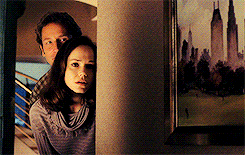
Which is why, twenty months later, the first robot child is offered to Henry and Monica Swinton (Sam Robards and Frances O’Connor), a couple...with a child. Um. Guys. You JUST SAID that there are legit childless couples who need a child, and those people would be best suited to love that robot child back (a VERY GOOD question raised by one of Hobby’s subordinates). So why give it to a couple whose son is still alive? Yeah, he’s got a rare disease that they don’t have a cure for yet, and is currently in cryostasis, BUT THEY HAVE A KID! Surely, that’s going to be a potential emotional conflict! And what if the kid wakes up or some shit? This is a TERRIBLE goddamn idea. Think this shit through, guys.
And yet...
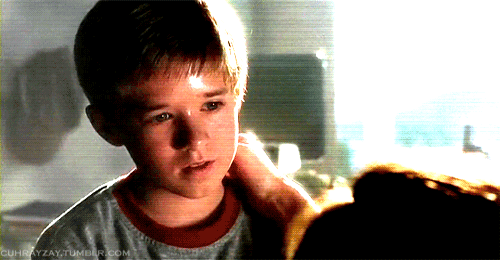
This is David (Haley Joel Osment), Cybertronics’ first child robot, brought home by Henry to essentially replace their son. Which is AMAZINGLY FUCKING TONE-DEAF AND INSANE, GODDAMN. That’s extraordinarily messed up. And, for the record, I totally get what Spielberg’s going for, but Jesus Christ, man. This was a terrible way to go about this. And it gets fucking WORSE.
See, Henry (who actually works for Cybertronics) tells Monica that, once they sign the papers and complete the updates, David will imprint on them and see him as their true parents, loving them unconditionally. Which...yeah, fuck, that’s an entire DUMP TRUCK of ethics issues right there. And, while we’re at it, David is...creepy as shit. I mean it, dude, Haley Joel Osment is a VERY good child actor, but he’s laying on the creepy robot child thing THICK. And yeah, this is BEFORE he imprints on them. Jesus fuck, man, there’s a scene where the still uncomfortable Monica is outside of a glass door, and he looks back at her THROUGH THE DOOR like a goddamn SERIAL KILLER.

And I gotta tell ya, dude does not lay off that creepy-ass dial one iota. And for that matter, the music by John Williams ISN’T FUCKING HELPING. LISTEN to this shit, and imagine a robot child that you don’t know wandering around your house. It’s amazingly fucking creepy.
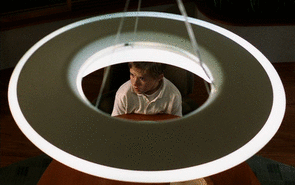
AND IT JUST. KEEPS. GETTING. WORSE. There’s a scene where they’re all at dinner, right, and David’s just staring at them as they eat, mimicking their actions. After all, he’s a robot, he can’t actually eat or drink anything because of his internal working. And then, out of FUCKING NOWHERE, he starts laughing like the FUCKING JOKER, and it scares the EVER-LOVING SHIT OUT OF ME. And somehow, they laugh alongside him, in the never-ending Stockholm syndrome that is this movie! And as soon as its over, he just STOPS laughing, spontaneously. Fuck me, man, I’m tempted to stop watching here and now, and I’m only TWENTY MINUTES IN! I need a fucking break.
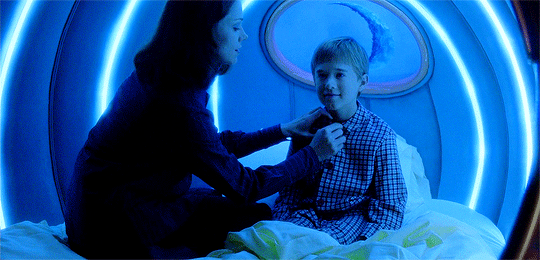
And after that...OF COURSE she decides to activate his imprinting protocols to make him, let me remind you, LOVE HIM FOREVER! She reads out a series of words, and after “FREIGHT CAR”, he knows his mission is to kill the Prime Minister of Sokovia. But first, he’ll settle down and love Monica unconditionally (again, FOREVER), calling her Mommy and making me shit my pants in fear. IT WASN’T ME, IT WAS FUCKING DAVID
Oh, and by the way, isn’t it kinda shitty to do that without Henry being involved AT ALL? Like, cool, he has unconditional maternal love, but Henry wasn’t a part of that conditioning at all! And he still refers to him as “Henry” instead of Dad! However, Henry definitely doesn’t care about that, because he still sees David as only a robot. Hey, guys, maybe using these two as your first experiment with a robot child WAS A TERRIBLE FUCKING IDEA, YOU IDIOTS! No wonder William Hurt was cast as Thunderbolt Ross in the MCU. Already shown he can play a character with shitty ideas before.
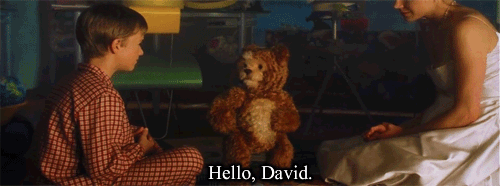
Anyway, after this terrible series of events, David prevents the parents from leaving one night due to his childlike antics. When Monica goes to comfort him, he asks how long she’ll live, and tells her that he hope she never dies, a COMPLETELY NORMAL THING TO SAY. Look, I get that he’s a robot, but only a goddamn emotionless sociopath would program emotional responses like this into a robot. Which, given what we’ve seen of Hobby, makes sense.
In response, she gives him Teddy (Jack Angel), a technologically advanced teddy bear with sentience, a personality, and the voice of Astrotrain from The Transformers TV series. Because, yes, I am THAT MUCH of a goddamn nerd.

Soon after, the house gets a phone call, which David receives...literally. He takes the phone and allows it to speak through him. It turns out that, shock beyond shocks, THEIR SON IS CURED! Yeah, fuck. Maybe giving David to a family with a STILL LIVING SON is a fucking ABSOLUTELY TERRIBLE IDEA, for about a thousand reasons.
And, fucking understandably, Martin Swinton (Jake Thomas) is a little upset to find out that he’s essentially been replaced by a robot kid. Although, to be fair, he’s also kind of a dick to David, holding his humanity over him and treating him as a toy that he attempts to manipulate and bully. My Lord, this is a massively stupid idea. And Martin immediately shows his dickishness by asking his mother to read Carlo Collodi’s The Adventures of Pinocchio to them. Which is meant to be a punishment for Pinocchio. However, of course, David loves it.

Still, however, there’s trouble in paradise for David, as he tries to compete with Martin for being a real boy, and eats spinach at dinner one evening. Despite Teddy’s mildly ominous warning to him (”YOU WILL BREAK”), he keeps eating until he basically has a stroke and breaks, forcing him to be repaired by some of Cybertronics’ technicians. Monica has a bit of a break down as a result, which Martin notices. This causes Martin to go pure supervillain, manipulating David to do creepy things in order to insert doubt into Monica about David. Jesus, Martin’s a creepy kid, too. No wonder Monica grew to be cool with David, her actual son is a FUCKING SOCIOPATHIC MONSTER! Are there ANY truly normal people in this world? IS THIS WHAT THE FUTURE IS?
Martin convinces David to cut a lock of Monica’s hair while she’s sleeping. And lemme tell ya, a little boy holding scissors over someone while they sleep is not exactly comforting. Henry agrees, and after stopping him, believes that they need to return him. Monica disagrees, knowing that they’ll destroy him if brought back. But David, ever the semi-sociopath himself, ignores any signs of humanity in David and dismisses Monica's feelings for him entirely. He also says this thing about “IF HE CAN BE PROGRAMMED TO LOVE, CAN NOT HE BE PROGRAMM-ED TO HATE?”, which...no. No, he cannot. He didn’t learn to love, he was programmed to. And, again, that’s ethically FUCKED, but taking that into account...no. HE WASN’T PROGRAMMED TO HATE, HENRY. Goddamn, buddy, use your head here.

It’s Martin’s birthday, and his friends at the pool party expose David to the fun world of anti-robot (or Mecha) racism, and test to see if he has Damage Avoidance Systems by threatening him with a knife. And he does. Buuut, when those systems kick in, he goes to the nearest point of safety to keep himself safe. That point is, unfortunately, Martin, whom he gets behind...and accidentally drags into the pool.
Thing is, because of Martin’s recent illness, he can’t exactly swim, meaning that David almost drowns him. When Henry and other partygoers go to save him, they abandon David in the pool completely. And now, David’s fucked. Because although this situation isn’t even a little bit his fault, he also just nearly killed Martin. And so, after seeing notes that he’s been writing to her, Monica offers to take for a “ride in the country”. Which definitely means something good. In reality, she’s planning on taking him back to Cybertronics. But once in the car, there’s a change in plans. And hear me out...it’s arguably far more horrifying.

She decides to abandon him in the woods completely, despite how hard it is for her to leave him. She’s sparing him from death, sure, but also throwing him into a world he doesn’t understand, and for reasons that he doesn’t understand. It’s genuinely terrible. And then...yeah, she leaves him forever, to an uncertain future.

End Act One.
I think this is a good place to stop. It’s early, and I need more coffee to handle this shit. See you in Part Two. Of Three. Yup. It’s a long one.
#a.i. artificial intelligence#ai artificial intelligence#steven spielberg#stanley kubrick#haley joel osment#jude law#frances o'connor#brendan gleeson#william hurt#science fiction may#sci-fi may#user365#365 movie challenge#365 movies 365 days#365 Days 365 Movies#365 movies a year#movieedit#filmedit
10 notes
·
View notes
Text
Utopian Literature 5
20th-21st centuries
NEQUA or The Problem of the Ages by Jack Adams – A feminist utopian science fiction novel printed in Topeka, Kansas in 1900.
Sultana’s Dream (1905) by Begum Rokeya - A Bengali feminist Utopian story about Lady-Land.
A Modern Utopia (1905) by H. G. Wells – An imaginary, progressive utopia on a planetary scale in which the social and technological environment are in continuous improvement, a world state owns all land and power sources, positive compulsion and physical labor have been all but eliminated, general freedom is assured, and an open, voluntary order of “samurai” rules.[27]
Beatrice the Sixteenth by Irene Clyde – A time traveller discovers a lost world, which is an egalitarian utopian postgender society.[28]
Red Star (novel) (1908) Red Star (Russian: Красная звезда) is Alexander Bogdanov’s 1908 science fiction novel about a communist society on Mars. The first edition was published in St. Petersburg in 1908, before eventually being republished in Moscow and Petrograd in 1918, and then again in Moscow in 1922.
The Millennium: A Comedy of the Year 2000 by Upton Sinclair. A novel in which capitalism finds its zenith with the construction of The Pleasure Palace. During the grand opening of this, an explosion kills everybody in the world except eleven of the people at the Pleasure Palace. The survivors struggle to rebuild their lives by creating a capitalistic society. After that fails, they create a successful utopian society “The Cooperative Commonwealth,” and live happily forever after.[29]
Herland (1915) by Charlotte Perkins Gilman – An isolated society of women who reproduce asexually has established an ideal state that reveres education and is free of war and domination.
The New Moon: A Romance of Reconstruction (1918) by Oliver Onions[30]
The Islands of Wisdom (1922) by Alexander Moszkowski – In the novel various utopian and dystopian islands that embody social-political ideas of European philosophy are explored. The philosophies are taken to their extremes for their absurdities when they are put into practice. It also features an “island of technology” which anticipates mobile telephones, nuclear energy, a concentrated brief-language that saves discussion time and a thorough mechanization of life.
Men Like Gods (1923) by H. G. Wells – Men and women in an alternative universe without world government in a perfected state of anarchy (“Our education is our government,” a Utopian named Lion says;[31]) sectarian religion, like politics, has died away, and advanced scientific research flourishes; life is governed by “the Five Principles of Liberty,” which are privacy, freedom of movement, unlimited knowledge, truthfulness, and freedom of discussion and criticism.[citation needed]
Lost Horizon (1933) by James Hilton - The mythical community of Shangri-La
War with the Newts (1936) by Karel Čapek – Satirical science fiction novel.[citation needed]
For Us, The Living: A Comedy of Customs (1938, published in 2003) by Robert A. Heinlein – A futuristic utopian novel explaining practical views on love, freedom, drive, government and economics.[citation needed]
Islandia (1942) by Austin Tappan Wright – An imaginary island in the Southern Hemisphere, a utopia containing many Arcadian elements, including a policy of isolation from the outside world and a rejection of industrialism.[citation needed]
Walden Two (1948) by B. F. Skinner – A community in which every aspect of living is put to rigorous scientific testing. A professor and his colleagues question the effectiveness of the community started by an eccentric man named T.E. Frazier.[citation needed]
Childhood’s End (1954) by Arthur C. Clarke – Alien beings guide humanity towards a more economically productive and technologically advanced society, allowing humans to broaden their mental capacities.[citation needed]
Island (1962) by Aldous Huxley – Follows the story of Will Farnaby, a cynical journalist, who shipwrecks on the fictional island of Pala and experiences their unique culture and traditions which create a utopian society.[citation needed]
Eutopia (1967) by Poul Anderson
The Dispossessed: An Ambiguous Utopia (1974) by Ursula K. Le Guin - Is set between a pair of planets: one that like Earth today is dominated by private property, nation states, gender hierarchy, and war, and the other an anarchist society without private property.
Ecotopia: The Notebooks and Reports of William Weston (1975) by Ernest Callenbach – Ecological utopia in which the Pacific Northwest has seceded from the union to set up a new society.[32]
Woman on the Edge of Time (1976) by Marge Piercy – The story of a middle-aged Hispanic woman who has visions of two alternative futures, one utopian and the other dystopian.[33]
The Probability Broach (1980) by L. Neil Smith – A libertarian or anarchic utopia[34]
Voyage from Yesteryear (1982) by James P. Hogan – A post-scarcity economy where money and material possessions are meaningless.[35]
Bolo'Bolo (1983) by Hans Widmer published under his pseudonym P.M. – An anarchist utopian world organised in communities of around 500 people
Always Coming Home (1985) by Ursula K. Le Guin – A combination of fiction and fictional anthropology about a society in California in the distant future.[citation needed]
Pacific Edge (1990) by Kim Stanley Robinson – Set in El Modena, California in 2065, the story describes a transformation process from the late twentieth century to an ecologically sane future.[36]
The Fifth Sacred Thing (1993) by Starhawk – A post-apocalyptic novel depicting two societies, one a sustainable economy based on social justice, and its neighbor, a militaristic and intolerant theocracy.[citation needed]
3001: The Final Odyssey (1997) by Arthur C. Clarke – Describes human society in 3001 as seen by an astronaut who was frozen for a thousand years.
Aria (2001-2008) by Kozue Amano – A manga and anime series set on terraformed version of the planet Mars in the 24th century. The main character, Akari, is a trainee gondolier working in the city of Neo-Venezia, based on modern day Venice.[citation needed]
Manna (2003) by Marshall Brain – Essay that explores several issues in modern information technology and user interfaces, including some around transhumanism. Some of its predictions, like the proliferation of automation and AI in the fast food industry, are becoming true years later. Second half of the book describes perfect Utopian society.[37]
Uniorder: Build Yourself Paradise (2014), by Joe Oliver. Essay on how to build the Utopia of Thomas More by using computers.[38]
The Culture series by Iain M. Banks – a science fiction series released from 1987 through 2012. The stories centre on The Culture, a utopian, post-scarcity space society of humanoid aliens, and advanced superintelligent artificial intelligences living in artificial habitats. The main theme is of the dilemmas that an idealistic, more-advanced civilization faces in dealing with smaller, less-advanced civilizations that do not share its ideals, and whose behaviour it sometimes finds barbaric. In some of the stories action takes place mainly in non-Culture environments, and the leading characters are often on the fringes of (or non-members of) the Culture.
9 notes
·
View notes
Note
I don't know if you're doing book recs, but in case you are: do you have recs for books that feel cozy and comfortable? I realize this might seem vage, but I'm thinking about gentle prose and/or stories about women just living their lives.
That’s honestly one of my favourite genres, and I often have to fall back on letters or journals for this kind of serene daily life atmosphere, since novels insist on introducing conflict. Although low-stakes conflict is okay, or when you know exactly what to expect from an author and you trust that she will write and resolve conflict like an old lady knitting a sock, neatly and affably.
Ivy Compton-Burnett’s books are not for everyone, I think, as they are 90% dialogue and somewhat insubstantial, you don’t really remember what it was about once it’s over, only that it was irresistibly funny at times, and smart, like a very light pastry. Her books consist mostly of characters commenting on & analysing events that took place off-screen and they feel like a gentle mockery of the human species, I don’t know, I love her. I always suggest to start with Elders and Betters to see if you have a taste for her writing.
I like Patricia Wentworth’s Miss Silver crime novels, most of them are set in quaint British villages in the 1930s and they feel very snug and intimate and lovely despite being articulated around, well, a crime. Probably due to the fact that the crimes are solved by a kindly old lady detective.
Rosamunde Pilcher’s novels are in the “you know exactly what to expect from this author” category—female characters, Cornish or Scottish countryside, a warm and tranquil atmosphere. I like The Shell Seekers because I like old lady protagonists.
My favourite novel with an old lady protagonist is Elizabeth Moon’s Remnant Population, it’s technically science-fiction but doesn’t really feel like it. Humans have colonised a planet that turned out to be not so well-suited for colonisation, so they all decide to leave. The only person who remains is an old lady who secretly thinks it will be heaven to be left behind with this planet all to herself, after spending decades taking care of others and not living for herself. The book follows her daily life after everyone has left and feels very warm and peaceful, she is quite content and eventually discovers an alien life form that looks like strange intelligent birds, and befriends them. It’s lovely.
Becky Chambers’ novels are sci-fi that feels more like sci-fi, with spaceships and AI and stuff, but they are heartwarming, with interesting female protagonists and sweet endings. I liked Libration.
Lillian Beckwith’s The Hills is Lonely and Laura Cunningham’s A Place in the Country are two memoirs by women about going to live in the countryside, that were quite funny, had p much no conflict and were just whimsical, light-hearted vignettes of life.
Elizabeth von Arnim! The Enchanted April is enchanting and feels very happy. It’s about a woman who finds her life in England a bit dreary and decides to spend her savings on renting a mediaeval castle in Italy for a holiday, and finds three other women, through a newspaper ad, to accompany her and split the rent with her. A Solitary Summer and Elizabeth and her German Garden are also lovely, more diary-like and the latter more focused on gardening (as the title suggests).
If you like gardens, Dorothy Sucher’s The Invisible Garden is also nice; it starts when the author decides to buy a house because she fell in love with its garden and the little river running through it, and it follows her various (and sometimes failed) attempts to care for it, create a pond, a wildflower meadow; along with her thoughts about life & things.
Edna Walling’s biography by Sara Hardy which I read earlier this year was also a lovely book about gardens—Edna was a very famous designer of gardens in 1930s Australia, who at one point bought a plot of land to fulfill her dream of creating a pretty landscape of little cottages with perfect gardens—it was an enjoyable, no-conflict biography.
Margaret Forster’s Keeping the World Away is at first about a female painter who paints a still life of a quiet little attic bedroom, and then it follows the women who successively own that painting over the next century, and who all somewhat long for a small peaceful space like this sunny attic room. It isn’t exactly happy but feels light and serene, kind of like the painting itself, which seems banal at first but then grows on you.
Three non-fiction books by women that I really liked: Arika Okrent’s In The Land of Invented Languages, Alexandra Horowitz’s On Looking, and Robin Wall Kimmerer’s Gathering Moss—all three were interesting and warm and sweet in the way nonfiction books are when the author feels affectionate towards her subject matter.
Rabih Alameddine’s An Unnecessary Woman is a bit different than the above recs, maybe less cosy-sweet (mainly due to its taking place in war-torn Beirut) but a very good book about a 70-something woman who used to work in a bookshop, happily lives alone, and each year starts a new translation of a literary classic into Arabic for her own private enjoyment. She isn’t always content but I liked reading her thoughts, the atmosphere of the book was calm and uneventful (in a good way), with a lot of literary reflection, and the ending was heartwarming.
(Lots of old lady characters in this list—they are often the ones that make for a peaceful gentle novel, because they have left all conflicts behind, like in Vita Sackville-West’s All Passion Spent, about a widow in her late 80s who wants to get away from her children and grandchildren and rent a pretty little house and finally live for herself)
May Sarton’s journals are very quiet and thoughtful. I like The House by the Sea, the one she wrote as she was living alone in a cottage by the sea with her little dog and her garden and her writing.
I don’t think Mary Oliver needs to be rec’d at this point but House of Light is very, very lovely.
#ask#book recs#i hesitated to rec Rosamond Lehmann's Dusty Answer but although it feels quiet and soft there is an atmosphere of sadness#that might not be what you are looking for
638 notes
·
View notes
Note
Could you recommend some adult sff? Love your blog btw!
Thank you!
And ok, I could give you better personalized recs if you give me some idea of what you’re looking for or what you like, but I’m gonna give you some general recommendations. Also I only really feel comfortable recommending books that I have personally read, and there are tons more out there than what I have read. If you want to find more, looking at recent Hugo nominations over the past few years might be helpful. Also one of the reasons why I know anything at all about the SFF world is that I’ve been listening to the Sword and Laser podcast for like, a decade. I never really mention that podcast, but its literally why I started reading at all and also they have a pretty active goodreads group as well.
So recommendations:
Ancillary Justice by Ann Leckie:
This is one of my favorite books period. This is a far future space opera about an artificial intelligence who used to be a spaceship and now is only one human body, and she is ANGRY ABOUT that. I don’t really want to say more than that, but if you like AI shenanigans and being sorta confused as to what is going on the entire time, then this is the book for you! It’s the first book in a completed trilogy.
The Eye of the World by Robert Jordan:
Obviously I’m gonna recommend the Wheel of Time. This is the first book in a 14 (actually 15) book series and if you need something to do with the next 1-5 years of your life *motions toward EoTW*.
So the Eye of the World, I think is uniquely good as a book if you kinda want to get into adult fantasy for a few reasons. For one thing, its kinda considered to be one of those “classics” of the genre but its not too old to be offputting to some readers. It’s a 30 year old book, so its not reflective of the genre now, but you can definitely see its influence all the place, even outside of just books. The Eye of the World specifically, also goes out of its way to make readers comfortable. It leans heavy on Tolkien references and tropes at first without being a straight up copy of Lord of the Rings like some classic fantasy books are. Its done very purposefully, in my opinion, to make the reader feel like they have some idea of what’s going on, and the series quickly drops the Tolkien references as soon as its established itself enough.
Also the Gandalf parallel for the series is a smol bi lady and there is 24 year old rage healer who wants to fight everyone with her own two fists.So many women to stan.
Leviathan Wakes by James S.A. Corey
This is the first book of the Expanse, which is a nearish future space opera that takes place in our solar system. Mars has long ago been colonized and is a completely separate government entity than Earth, and conflict between the two planets has been stirring. The Asteroid Belt has also been colonized and have long been little more than tools of corporations that run their colonies. A group of ice haulers working in the outer planets get in the middle of one of the biggest secrets in the solar system and find themselves in all kinds of trouble.
I don’t really want to say more than this, but this is probably the only SF series that I actively keep up on when a new book comes out. There are 8 books our currently, and the 9th and final book will be out sometime in the near future. There are also several short stories and novellas set in the world, and there’s a TV show that I really like though I need to catch up on it.
The Fifth Season by N.K. Jemisin
Hello, this book comes with content warnings for literally everything, but it is such a good book/trilogy. This is book about a woman trying to find her daughter again in the middle of the apocalypse. Definitely a heavy read but absolutely brilliant. The world has a magic system based on geology and the people that can use that magic....saying they’re discriminated against is an understatement. I don’t want to say much more about it, but if you have any kind of content you can’t read for whatever reason, I’d check before picking this up. This is the first book in a completed trilogy
Station Eleven by Emily St. John Mandel
So this isn’t really super SF heavy and is actually sold as a literary book, but it takes place after a flu pandemic has wiped out a large portion of the population...so maybe this is a bad time to read this book, OR its the best time to read it. Depends on how you’re dealing with *motions at the world*
The book flashes back to before and during the pandemic a lot, but is largely about art’s importance and is actually quite optimistic in its messaging, and this is another of my favorite books ever. But yeah, might be a bad time for you to read it of you can’t deal with the content now.
The Priory of the Orange Tree by Samantha Shannon
I just remembered that this book also has a plague, but its a subplot and not the major thing. So this is a big ol’ chonky standalone book that is high fantasy, deals with multiple cultures having to interact and work together, and has dragons. Also there’s a genunine slow burn f/f romance and *chef’s kiss*. I can’t really say much else, mostly because I struggle to explain this book, but its very good and probably my favorite book from last year.
The Calculating Stars by Mary Robinette Kowal
In this house we stan Mary Robinette Kowal, ok?
So this is a science fiction that is more an alternate history that poses the question, hey, what would have happened if an asteroid slammed into the east coast in 1952 and the world had to scramble to colonize Mars so that everyone didn’t die on earth when the climate got catastrophic, because that’s the inciting action of the book. The main character is a Jewish woman who was a WASP pilot in WW2 and is a computer for the space program when all this happens. The book deals with sexism, and racism, and xenophobia, and all the social issues that are gonna come up with it being set in 1952, but Mary Robinette doesn’t flinch away from addressing social issues in any of her books, even when it makes her main characters look bad. (Also if you like Pride and Prejudice, she has a series that is just Pride and Prejudice with magic and like, yeah, its good).
A Natural History of Dragons by Marie Brennan
This is a book which poses a question, what if dragons were like weird animals that were real and an eccentric woman spent her entire life traveling the world to study them and then told the stories of that in her memoirs when she was too old to care about the consequences of publishing all her scandals. That’s what the book is about. This one is probably actually the weakest in the series, just because it deals with so much set up. It’s a great series to get on audio because Kate Reading is a fantastic narrator, and the prose works so well as audio, because it’s just someone telling you her life story. There are five books in the series.
All Systems Red by Martha Wells
So this is a novella and is the first in the murderbot series. Basically a killer robot gets addicted to television shows and accidentally became sentient. I haven’t read the others in the series, but I really need to reread this one and get to the others.
Jade City by Fonda Lee
This is a fantasy set in world sorta inspired by the early 1900s but is in a fantasy world. It’s like a mafia movie and kung fu movie had a baby and it was this book. The sequel is out currently, but the third book is set to release next year.
An Unkindness of Ghosts by Rivers Solomon
This is another heavy read. This is a SF story set on a generation ship that has a society very heavily inspired by the antebellum south. There’s class issues, race issues, gender issues, mental health issues. All kinds of things intersecting here. Its fantastic, but a heavy read.
Assassin’s Apprentice by Robin Hobb
This is another fantasy classic, and is the first of the Farseer Trilogy. The title is sort of also a description of the book, so like. I’m not sure what else I can say. I haven’t read further into the series, but people I trust love it, and honestly I need to reread this and read more of the books.
Doomsday Book by Connie Willis
So if you think that Station Eleven might be a bad book to read at the time, then this is THE WORST POSSIBLE BOOK TO READ RIGHT NOW. Or, maybe the best. Depends on how you cope. This is a book about time travelers based in Oxford and the main character accidentally gets stranded in the past right as the Black Plague is about to hit. And it hits. The book is horrific. The second book in the series is much funnier. This one ain’t funny, but is good. Just, oof.
Mistborn or Warbreaker by Brandon Sanderson
So if you want to get into the Cosmere, which is a series of series that interconnect and will ruin your life, then then my personal opinion is to either start with Mistborn or Warbreaker. People might not agree with me, but that’s my personal opinion.
Warbreaker is currently a standalone (a sequel will come out eventually but its not set up for a sequel so you can 100% read it as a standalone). The magic in this world is based on colors, and the story revolves around two sisters. One of them is betrothed to the horrific God King of their neighboring kingdom. The other sister ends up being sent in her place because their dad hates her. I adore Warbreaker so much. It has it all. Two women discovering their true places on the prep/goth spectrum. Talking swords. Vivenna. Everything you can need right there.
Mistborn is a trilogy that is very emo and will ruin you. Its about people who swallow metal to get magic powers and live in world where the dark lord won already, so they’re all emo. And that was the worst description of Mistborn I ever could have written, but I find it too funny to change.
So if you’re interested in the Cosmere, but are afraid to commit long term, pick up Warbreaker. If you want to get into a series right away, pick up Mistborn.
72 notes
·
View notes
Text
February Contest Submission #12: Life On Mars
words: ca. 3200 setting: Modern AU lemon: No cw: Angst, Horror Elements, Psychological Horror, Mindfuckery, Hospitals, Ancient Alien Wars
“Status update?”
“All systems nominal. Solar charge at 65%.”
Elsa looked at the screen through her glasses, the monitor displaying the rover’s current route as it made its way across the red planet. OLAV was due to be passing over an unexplored sector of the Syritis Major region of Mars today and there would no doubt be a lot of analysis and data gathering to be done. Their rover was going to be the first visitor from earth to visit this largely explored region of the red planet.
“Good, keep OLAV on his present course,” Elsa stated. “Let me know once it reaches the site.”
“I’m sure he’ll be fine,” Anna replied.
The blonde rolled her eyes. She never understood why Anna kept referring to the rover as if it was a living being. OLAV was a robot, a mindless automaton. It only knew what it was programmed to know. It wasn’t a true artificial intelligence like the ones from the science fiction movies Anna and her had both grown up with.
And yet, it was always rather cute when Anna did it. It was part of why she fell in love with her; Anna and her seemingly limitless ability to be warm and affectionate to those around her, even to a robot with no real life of its own. Elsa found that very endearing. She and Anna had been dating since college, and Elsa couldn’t have asked for anyone better to help her on this project. Working for NASA definitely was a dream come true.
Anna in particular had a hand in designing OLAV in the first place, even naming him after a cuddly snowman plushie she had back in their college days. Though of course, she justified it by clarifying OLAV stood for “Omnidirectional Lifeform Analysis Vehicle”. All the same, Elsa found it adorable.
Anna relaxed back in her chair, grinning. “So… what are the odds we’ll find life today?”
“Anna, I swear you ask that question every day,” Elsa remarked with a playful roll of her eyes.
“But it’s the question that has haunted scientists like us for centuries, Elsa,” Anna said honestly. “Is there life on Mars?
Elsa had to giggle, knowing Anna was partly quoting the David Bowie song. Her girlfriend was such a nerd and she adored her.
But so far, that particular question still hadn’t been answered. It was a known scientific fact that at one point Mars did once support a much more habitable climate, with vast lakes and rivers. However, the loss of its magnetic field had resulted in the planet becoming the red, lifeless desert it was today.
If there had been life at some point, it was probably only very basic. Some sort of bacteria or another microscopic organism. And yet, if anyone could prove that life had indeed existed on Mars at one point, it could prove that life wasn’t just confined to the little blue and green orb that was the Earth but was out there amongst the stars in all sorts of shapes and forms.
“He’s just coming up to the ridge now,” Anna said.
“How much solar charge has OLAV got left?” Elsa asked.
The redhead looked at her screen. “52%.”
“The steep incline will likely drain the power of the motors by quite a bit. As soon as the rover gets over the ridge, shut him down for the night. The sun is starting to go down.”
“Yeah, he’s earned a good night’s sleep,” Anna said with a smile. She then stared at another one of the screens, showing life camera footage from the rover. Every few seconds a new picture would appear, showing where the rover had travelled every few seconds.
So far, all Anna had seen from the pictures was red sand and large boulders as the rover travelled up the ridge. It was rather basic and yet… it had a certain beauty to it. A hellish beauty one might say.
Mars was a fascinating world, even if it was a vast desert that didn’t really have much variety in scenery. Anna and Elsa and the rest of their team were just merely the latest in a long line of scientists and scholars wanting to discover the secrets of the red planet.
“Think Mars would be a good place for a vacation?” Anna joked. “I mean, there’s lots of sun there. Bet I’d get a great tan.”
“Unless you prefer sunbathing at minus 80 degrees Fahrenheit, I don’t think so,” Elsa replied flatly.
“Minus 80? Oh, that’s perfect for an ice queen like you.”
Elsa shot Anna a look and playfully nudged her girlfriend’s arm. “Oh shut it, you.”
Anna giggled. “Okay, okay, I guess that nickname has worn out its welcome.”
“It wore its welcome the week after you started calling me that back in college,” Elsa remarked.
“Well, you used to be so closed off when you were focused on your studies,” Anna retorted, smiling in nostalgia. “You got so into your work you practically cut off all contact with the outside world… and then you met me.”
Elsa smiled, blushing. She remembered fondly the days when Anna encouraged her to get out of their dorm room and get outside on their campus. Science had always been her passion, but she hadn’t truly felt love until she met Anna.
Leaning over, Elsa gave her girlfriend a kiss on the cheek. “Yes I did, and I couldn’t have been more thankful for anything else in my life.”
Anna giggled. “Should you really be making such comments to me here? We are supposed to be working right now.”
“Hey, I’m the project director here,” Elsa spoke with an air of faux haughtiness, upturning her nose slightly. “I think it gives me certain advantages.”
Anna giggled at that. Elsa smiled down at her. The two of them leaned in at that moment, almost kissing… and then something caught Anna’s eye. She blinked again, thinking whatever it was just a figment of her imagination, but no, there was indeed something unusual being projected on the screen.
“Wait… what’s that?” Anna asked.
She looked at the monitor with the live camera feed from the rover. In the corner of the screen, as the rover drove over the ridge, Anna saw a strange shape. Whatever it was, it didn’t appear to be a natural rock formation, but it was still too far away for Anna to see.
“You see something?”
Anna nodded and pointed at the screen. “There, right there.”
Elsa pulled down her glasses, leaning in closer. “That looks like a rock.”
“No, I don’t think it is,” Anna said quietly, eyes on the screen in focus. “It seems taller than everything else, taller than any of those other boulders…”
“Hmmm… how much charge does OLAV have left?”
“He just dipped below 45.”
“That should be just enough to get a closer look before we shut down for the night,” Elsa stated. She got up and looked across to another one of the scientists in the control room. “Kristoff, make a course adjustment. Left by about 15 degrees.”
“You got it!” The blonde man called back.
Anna looked at her screen again, seeing the camera view shift slightly as the rover altered its course. For the next few moments, she felt her heart begin to race in her chest. Was the hunch she was having correct? Was this strange object the proof mankind had always been looking for? In the next few minutes, they’d know.
Putting her hand on Anna’s shoulder, Elsa gave her a concerned look. She didn’t like to see Anna stressed like this. “Hey, relax. It might just be a rock.”
“I know… but for some reason, I don’t want it to be,” Anna admitted.
Elsa smiled. “You’re a determined one, Anna Armstrong.”
Anna merely smiled, before looking at her screen again, and then her jaw dropped. As the rover drove up closer to the strange object, Anna could see that her hunch had been right. Standing before the rover was a strange, tall structure. It was a tall obelisk, its surface covered in strange alien runes and hieroglyphs.
As Anna stared at the screen, she couldn’t believe what she was seeing. Right in front of her eyes was the evidence everyone had been looking for, signs of alien life. But Anna never thought they’d find something like this, an alien relic from a forgotten time.
“What in the…”
Elsa blinked. “That’s…my god, that’s it! That’s what we’ve been looking for!”
There were hurried murmurs and whispers all through the control room as the other scientists saw the image of the obelisk on their screens from the camera feed. The rover was stopped in its tracks, the camera panning up and down, giving the team back on earth a good look at every inch of the strange monument.
“So… what exactly do we do at a moment like this?” Anna asked in wonderment.
“I… I’m not sure,” Elsa said, still awestruck by the fact they had found genuine proof of alien life. After all, how else could one describe what was essentially a stone obelisk built on the surface of Mars. But that’s what indeed it was. As Elsa looked at the markings, she wondered what they meant. A warning? Some prayer to a divine being?
Looking at the screen again, Anna gazed at the strange glyphs. She couldn’t begin to understand them, but the more she looked at them, the more they seemed to be… glowing. Each of the symbols seemed to be glowing a deep, vibrant red, like the colour of blood.
The red glow seemed almost mesmerising to Anna, completely hypnotic. No matter how hard she tried, she couldn’t look away. As she stared more and more at the strange obelisk, she started to hear whispers in her ear, voices that clearly were not human. Deep, hissing tones that unsettled her completely.
Suddenly, the symbols flashed an even brighter red, as Anna heard the voices start screaming in her ear. Images suddenly filled her mind. Those of a vast empire that spanned what seemed to be the entire cosmos, fleets of ships that travelled to every world, a Mars very different from the one she knew, one of lakes and plant life and a beautiful green sky. And then chaos. Black, monstrous creatures that descended from the heavens, destroying everything in their path.
Anna wanted so desperately to look away from the horrific imagery she was witnessing, of the civilisation, she was witnessing being slaughtered by the black creatures, their world being utterly devastated to the point there was nothing but a red lifeless desert in its wake. Anna screamed in pain, trying to force the images from her mind, but it was no use. Her eyes were glowing bright red with alien energy and were bleeding, as was her nose and ears.
“Anna!” Elsa cried out, rushing to Anna’s side. Her girlfriend grabbed her head, screaming in agony as the alien visions were burned into her mind. Elsa grabbed ahold of Anna, holding her close. She stared at the monitor, seeing the glowing red obelisk.
“Shut the monitors down!” Elsa yelled, alarmed. “Don’t look at the obelisk!”
The other scientists did just that, shutting down each one of the computers until the room was in complete darkness. Anna was still screaming though, suffering in agony. She screamed louder, her eyes glowing the same bright red as the alien glyphs, those same glyphs flashing across her eyeballs.
Elsa felt her heart shudder in her chest, as she watched Anna, holding her close. Nothing in her life had prepared her for anything like this.
“Someone get a doctor, now!”
xXx
It was about half an hour before the ambulance arrived and Anna still hadn’t stopped screaming. By the time Anna had gotten to the hospital, she’d lost consciousness, but fortunately, she was still alive. Throughout all of it, Elsa stayed with Anna for as long as she could.
The doctors hadn’t found anything wrong with Anna, aside from some rather odd brain activity. Elsa hadn’t told them the exact reason why Anna had ended up in this way, telling them she’d merely suffered a seizure. She knew most people wouldn’t understand the truth.
As she was making her way back to Anna’s room with a cup of tea in her hand, Elsa suddenly got a phone call from Kristoff. He’d stayed behind to watch things at the control centre while Elsa escorted Anna to the hospital. She sat down outside the room, picking up her phone.
“Kristoff?” Elsa asked.
“Elsa, thank goodness,” Kristoff said, relieved. “I was worried I wouldn’t be able to get through to you. Some major shit just went down at the lab.”
“What?” Elsa asked. “What happened?”
“Just after you left, these guys in black suits showed up. They confiscated everything on the computers, including all the data we received from the rover. I think they might have been the FBI or something. They swore everyone to secrecy. I didn’t tell them about you and Anna though.”
Elsa sighed. It seems not only were aliens real, but so were the men in black. But she had to remain calm. Even if those government agents had taken all her data, everything she’d spent most of her life working on, her biggest priority was Anna and her safety.
“Thank you for letting me know,” Elsa responded.
“I’m so sorry, Elsa,” Kristoff told her. “I feel like I should have done something to stop them.”
“You did what you could,” Elsa said softly. “I suggest you go home and get some rest. It’s been… a really long day.”
“I’ll do that,” Kristoff nodded. “How’s Anna doing?”
Looking through the nearby window into Anna’s room, Elsa saw her girlfriend lying on the bed, motionless with an IV tube stuck in her arm. It pained her to see Anna like this. This wasn’t the first time Anna had been in the hospital since she’d known her, but she hadn’t felt this worried about her before either.
“No change in her condition,” Elsa said quietly, glancing back at her comatose lover. “The doctors can’t really explain what happened to her.”
“Damn,” Kristoff said, his face creasing in sympathy. “Well, if she does wake up, tell her I said hi, will you.”
“Sure thing,” Elsa smiled. “See you later, big guy.”
After hanging up, Elsa walked into Anna’s room, closing the curtains on the window that looked out onto the hallway. As she sat by Anna’s bed, she reached over and held her lover’s hand softly, gazing at her unconscious form lying beside her.
The room in the hospital was quiet, save for the ambience of whatever was going on in the corridors outside. As Elsa looked at Anna, she felt tears swell in her eyes. She wasn’t a religious woman by any means, but at this moment, Elsa was praying to god for Anna to make it.
Though as the hours ticked by, Elsa began to wonder if her love would ever awaken. It was at that point that Elsa started to blame herself. She was in charge of the mission and she should have stopped the rover before it approached that obelisk or perhaps she should have chosen a different route for the rover to take.
But at that point, Elsa realised that blaming herself wasn’t going to do anything, nor could she have predicted that something like this would have happened. What had been done was done and nothing could change that. All she could do now was keep hoping that all would be well again, that Anna would wake up.
Her prayers were answered.
“Elsa…” Anna croaked, barely above a whisper.
Elsa’s eyes widened, gazing at the redhead as she finally awakened from her unconsciousness. She held Anna’s hand tighter, staring into her eyes. “Anna!”
Anna looked up at her lover, her teal eyes fluttering open weakly. “W-What… Where am I?”
“In the hospital,” Elsa explained. “That weird obelisk we found on Mars did something to you. I… I was worried for a moment that you might…”
“I… I’m okay,” Anna assured her, weakly raising her hand and stroking Elsa’s cheek. The blonde sighed and touched Anna’s hand, resting her head against it.
“Do you… Do you remember what happened when you saw those glyphs?” Elsa asked. “All I saw was you looking at them and then you started screaming.”
“I… I remember now,” Anna groaned. “Oh fuck… it was horrible…”
“Easy,” Elsa placed a hand on Anna’s shoulder. “Relax for a moment, snowflake. Just take it one step at a time. Everything is going to be okay now.”
After Anna got a drink, she explained everything to Elsa. All the images she’d seen, the voices, how horrible it all felt. Elsa couldn’t begin to fathom what Anna had seen… but she was just glad that Anna had been strong enough to recover from it, a testament to her spirit.
But the whole affair had clearly taken its toll on her girlfriend. Every time she spoke, Elsa didn’t feel that sense of joy and excitement she usually got from Anna. It was as if the Anna she knew and love was gone and what was left was just an empty, emotionless shell.
“What do you think it all was?” Anna wondered.
“Well if I had to make a guess, I’d say when you looked at the glyphs, that obelisk must have telepathically beamed those images into your mind.”
“It all… It all looked so real,” Anna said, her voice still shaking. “It’s like it was a dream and yet I felt like I was really there on Mars, watching it all.”
“We probably won’t be able to tell anyone about this,” Elsa told her. “Apparently, the FBI or someone like them went to the control centre just after I left with you and took all our data.”
“What the hell?” Anna wondered. “Elsa… We need to tell people about this. This is big, really big.”
“I know, but if we try, the government will likely have us arrested,” Elsa argued.
“But people need to be told about this!” Anna shouted. “During those visions… when I saw the Martians get slaughtered… I saw these giant black monsters attacking them from space. I.. I couldn’t help but feel like those things wouldn’t have stopped at Mars.”
Elsa’s eyes widened. “Anna… what are you saying?”
“I’m saying I have this weird gut feeling that whatever destroyed Mars… might still be out there,” she then looked out of the window. “And… they might be watching us here and now… and one day, they might come to wipe us out too. And we have to be ready for them if they do.”
Elsa held Anna’s hand. “That won’t happen, Anna. Not as long as I’m around.”
“You promise?”
Elsa nodded, taking Anna’s hands and leaning in. The two of them touched foreheads and Anna sighed, welcoming Elsa’s loving, tender embrace.
“I promise. Whatever happens, we’ll face it… together.”
#elsanna#submission#february 2021 contest#prompt: ancient worlds#cw: angst#cw: horror#cw: hospitals#cw: aliens
4 notes
·
View notes
Text
Space Sweepers and the History of Working Class People In Space
https://ift.tt/eA8V8J
This week saw the release of Space Sweepers, Korea’s first big budget special effects space movie extravaganza. There are a lot of interesting things to say about this movie, but one of the things that makes it stand out is it’s an excellent portrayal of people in space who are skint.
See, I hate to break it to you, but you’re probably never going into space. Unless you’re a highly trained technical specialist (well done!) or a billionaire (pay your taxes!), your best shot at seeing Earth from space within your lifetime is the development of realistic-yet-cheap VR headsets.
And the thing is, a lot of the time this holds up in sci-fi as well. Space travellers are either living in a post-scarcity utopia, are part of the military, or are some kind of genius scientists.
Even where we see supposedly salt-of-the-Earth relatable types, like Han Solo or Mal Reynolds, their scruffy outfits and roguish ways can’t quite cover for the fact that they own and live in the equivalent of a massive luxury yacht or private plane. Serenity may look like a rust bucket, but it’s far from the equivalent of a white van, and while Mal is constantly complaining about the costs of fuel and repairs, that doesn’t change the fact that he seems to own the ship outright, and in “Oxygen” he appears ready to buy the ship for cash.
As for Han Solo, leaving for a moment his humble origins and that he won the ship in a card game, within the Galaxy Far Far Away the ratio of space travellers to non-space travellers doesn’t seem that different from the one on Earth. Yes, there are lots of smugglers and Tie-fighter pilots and interplanetary bounty hunters, but for every one of them there are millions of Tusken sand raiders, Jawa scrap merchants, moisture farmers and Corellian street rats. Spacecraft might come and go from the spires of Coruscant as regularly as buses, but the population density is such that most people on that planet will be lucky to see sunlight, let alone the stars.
Meanwhile, back in the real world, the chances of an ordinary person getting into space even in the foreseeable future vary between Willy Wonka Golden ticket level lucky, or truly dystopian. On the one hand, Elon Musk has announced the first all-civilian mission to space, led by billionaire Jared Isaacman (so, not what you’d call an everyman), two seats given to people who have won a place by donating to St Jude’s Hospital (it probably won’t be one of the smaller donors), and finally, one lucky front-line health worker.
But Elon Musk wants to colonise Mars, and sadly billionaires still need people to clean the toilets, so Musk has other ideas for how ordinary people might get into space. Unfortunately that idea is indentured slavery, demonstrating that the most prescient science fiction writers of our generation are the writers of first-person shooters.
This is why, outside of post-scarcity-fully-automated-luxury-space-communism, and the military, science fiction is always oddly quiet about money. With a few honourable exceptions.
We Just Work Here
The first and most obvious reason why any ordinary working-class person would end up in space is “they’re paid to”.
Pretty much the codifier of working-class people in space is Alien. The crew of Nostromo aren’t scientists, they’ve not got The Right Stuff. Nobody on that ship is getting a high school named after them. The crew of the Nostromo are basically truck drivers who venture off the highway and run into something nasty. Yes, ironically they show a great deal more competence, professionalism and intelligence in encountering an alien threat than the actual scientists in the prequel movie, but the first conversation these characters have when they come out of hyper sleep is about money. From the outset, these are people in a place of work.
It’s a model that set the format for gritty-industrial-working-class-people in space movies going forward for better or worse. Event Horizon just lifts Alien’s aesthetic completely for the rescue ship Lewis & Clark, as does the videogame series Dead Space, like Alien, set aboard a mining ship.
Away from the horror genre, Outland sees Sean Connery play sheriff in a final frontier mining town that could have taken place in the same world as Alien.
And of course, Red Dwarf, which not only made good use of the Alien aesthetic, but also cast the colony commander from Aliens as their Captain, to tell the story of chicken soup repairmen in space.
Across all of these stories, and of course the aforementioned videogames, the life of the blue collar space traveller is an unpleasant one, exploited by a company that not only controls your life while you work, but also owns all of your food, water and air. Indeed, it’s not rare for them to go further. In Moon, another film where the spacemen-to-earthmen ratio seems not far what it is now, Sam Bell’s employer decides to save the cost of training employees and ferrying them back and forth from Earth to the Moon by taking one employee and filling a cellar full of his pre-programmed, short-lived disposable clones.
Space Sweepers
Public Transport
But maybe you don’t want to work for “the Man”, not an unwise call given the Man is probably trying to feed you to something horrible in the hope of creating a new bioweapon. One surprisingly under-utilised method of getting into space is public transport.
In The Fifth Element, Bruce Willis plays a special-forces-operative-turned-cab-driver who, as part of his cover, wins a ticket to go on a space cruise. Although looking at the sets and the extras in this movie, as well as the packed-in-as-tightly-as-we-can apartments back on Earth, one gets the impression this is not an option open to the majority of working joes.
Perhaps the best example of this is in the shockingly under-loved 2018 flick, Prospect, featuring future Mandalorian Pedro Pascal.
In Prospect, the spaceship is little more than a rotating framework filled with cargo containers in front of a massive engine. The father and daughter prospecting team are on board a lander that resembles nothing so much as an old Apollo Lunar Lander on the inside, and as the mothership approaches their destination the ship doesn’t even stop, it just releases the lander, tells them when the ship is going to be passing back that way and warns them the line is being terminated, so there won’t be another ship passing that way.
This is a model it would be fantastic to see more of. The landing module is small enough that it’s entirely plausible that even these not-very-well-off characters could buy, hire or rent one. Rather than having the freedom of the space ways like Mal or Han, their travel options are entirely restricted by what destinations are profitable for large shipping companies and whether they’ll let you tag along. And while on the surface the aesthetic looks a bit Alien, in truth it feels far more like it’s cobbled together from relics of the actual space age.
Borrow Your Way Into Space
And finally, of course, there’s the Elon Musk solution. Borrow your way into space. One of the early places to use this idea was Gateway, by Frederik Pohl. Frederik Pohl in particular is fantastic at writing science fiction worlds where people actually have to worry about money. In Gateway and its sequels humanity has discovered Ancient Aliens left a space station nearby, stocked with a lot of spaceships. Being alien technology, humans can’t control the ships accurately, they’re limited pretty much to pressing the “Stop” and “Go” buttons, and when the ship flies off it might land on a world of fabulous riches, or it might chuck you into the heart of a star.
Prospectors who want to try their luck in these ships have to take out a loan to get to the station, and throughout the novel the protagonist is constantly aware of how many credits are in his account.
Which brings us back around to Space Sweepers. At first glance the Space Sweepers set-up might seem similar to that of the Millennium Falcon or Serenity – an extremely “used” looking ship run by a rag-tag bunch of misfits. But the first time we see the protagonist, Tae-ho, he’s in a pawn shop. As soon as he gets back to the ship we learn the crew are still paying off the cost of the ship, as well as the costs of repairs and parts.
We see an awful lot of “Space sweepers” throughout the film, junk collectors gathering up salvage from Earth’s orbiting collection of derelict spacecraft and defunct satellites. But these people don’t seem like roguish space pirates, the impression they give is more akin to app-based gig workers.
This is compounded by another issue – that to work in space you need a visa, with citizenship limited to the wealthy few who are able to afford a place on the deluxe orbiting space habitats.
Everything in Space Sweepers is driven by money, whether it’s Tao-Ho’s attempts to raise enough money to find his daughter, the robot, Bubs, and her attempt to get a humanoid body that reflects her gender, and of course, the $2 million reward for “Dorothy” which drives the whole plot.
cnx.cmd.push(function() { cnx({ playerId: "106e33c0-3911-473c-b599-b1426db57530", }).render("0270c398a82f44f49c23c16122516796"); });
Often space-based sci-fi is about the fantasy of freedom, of exploration. Even shows like Star Trek give us characters whose job isn’t much more than to fly around having adventures. But there is rich storytelling to be done about the people who have to clean the space toilets.
Chris Farnell’s novella series, Fermi’s Progress, is about a ship whose FTL drive vaporises planets, and features at least one space traveller who isn’t a scientist, super soldier or billionaire (although to be fair the other three characters are exactly that). You can find part one here.
The post Space Sweepers and the History of Working Class People In Space appeared first on Den of Geek.
from Den of Geek https://ift.tt/375jTzb
6 notes
·
View notes